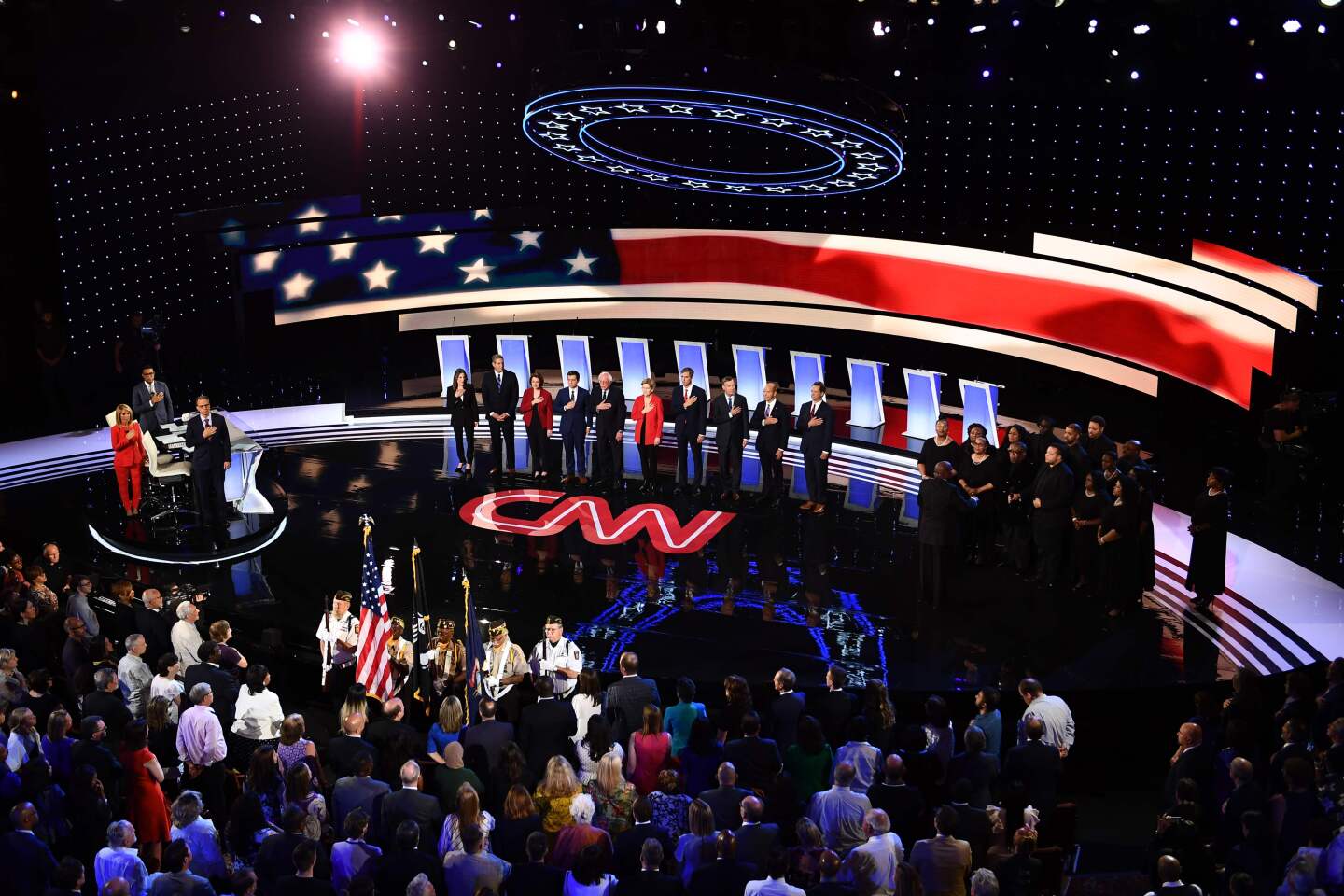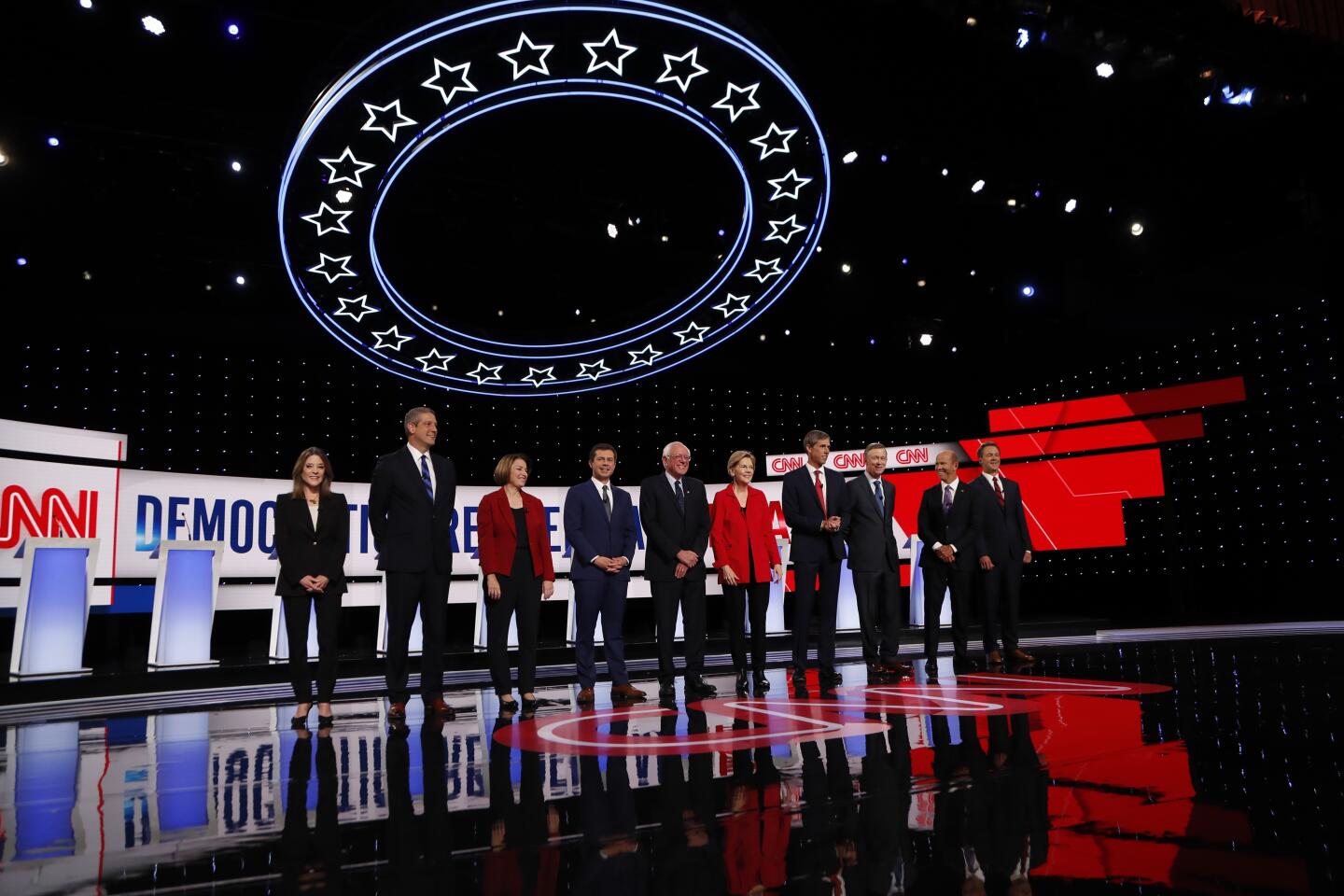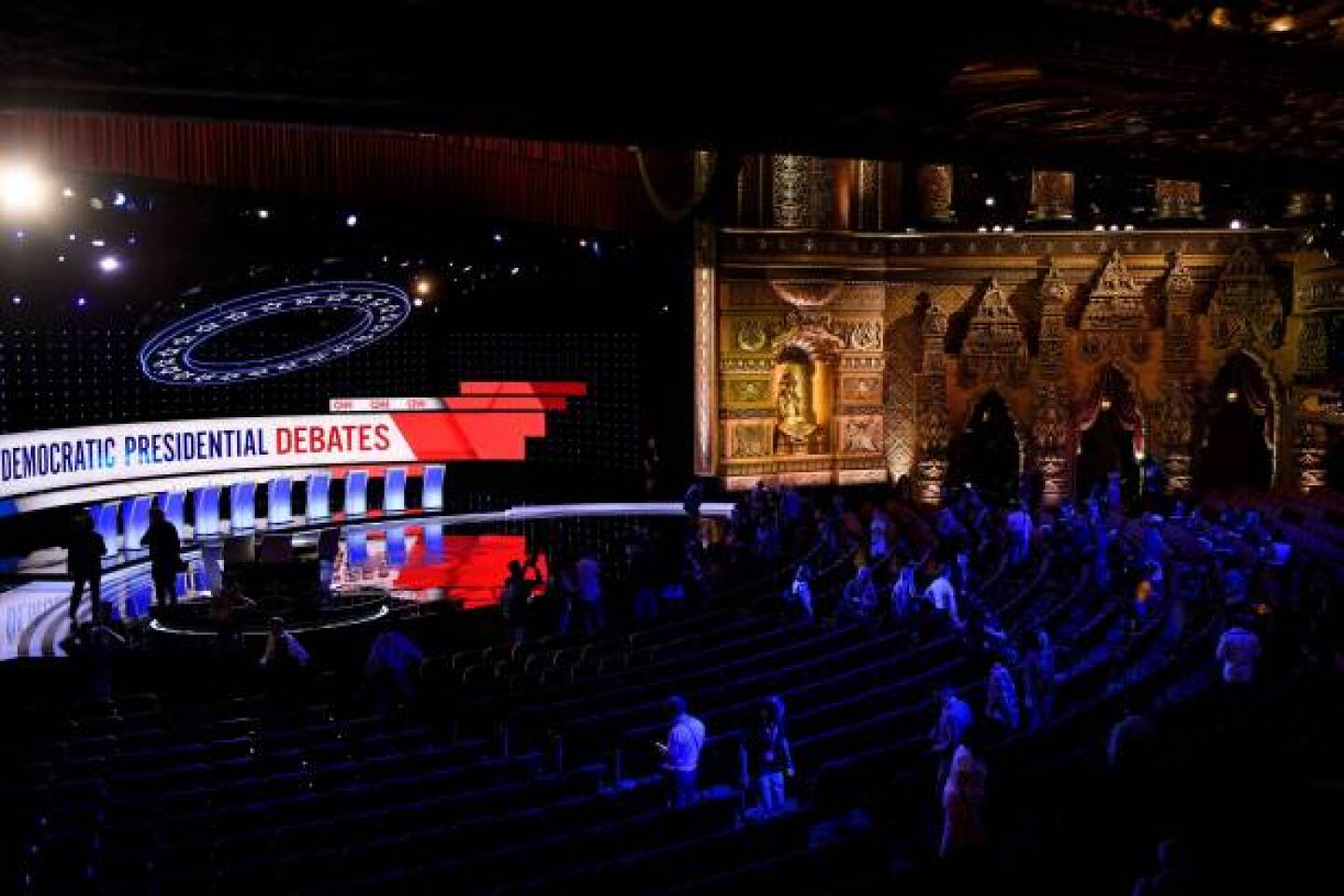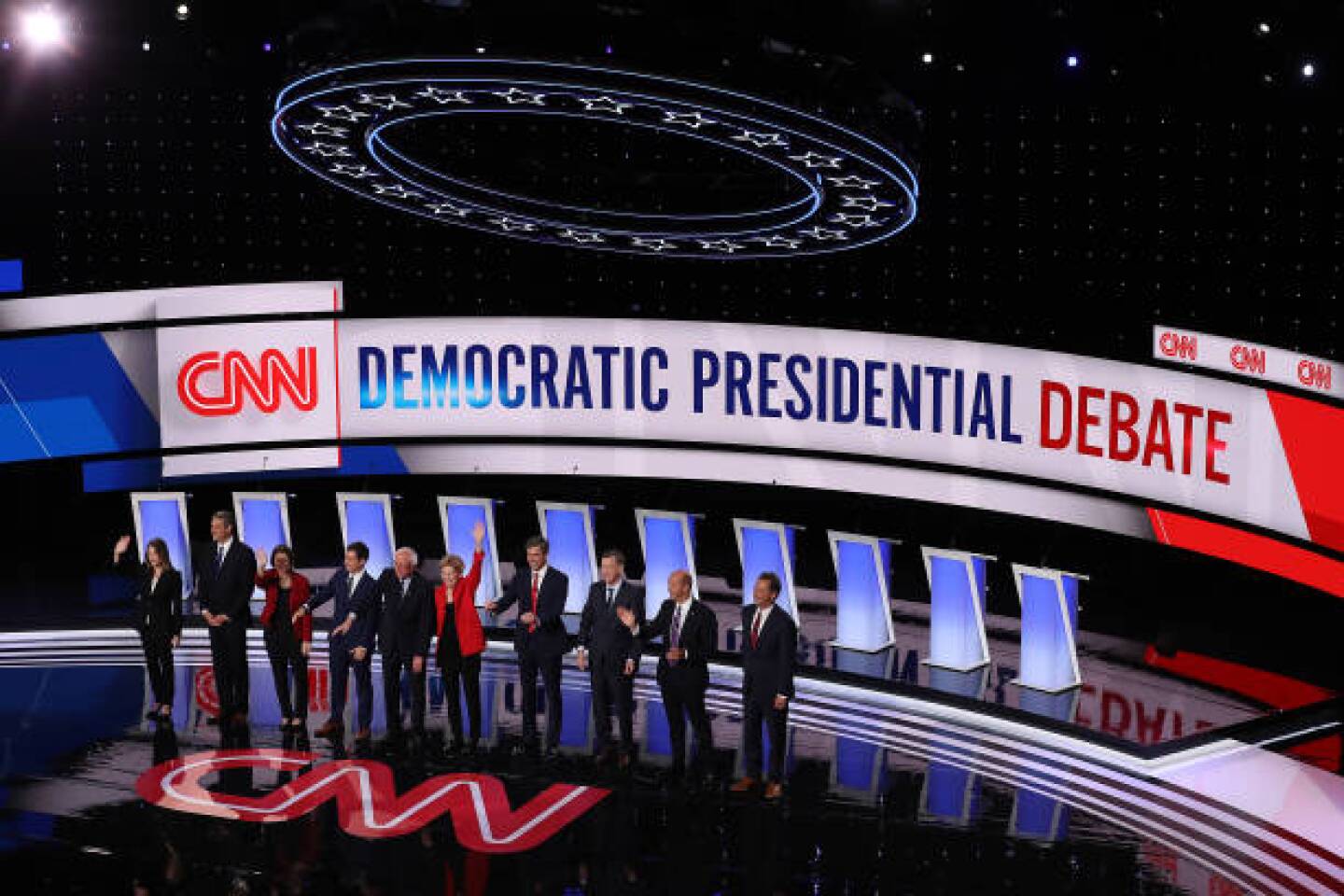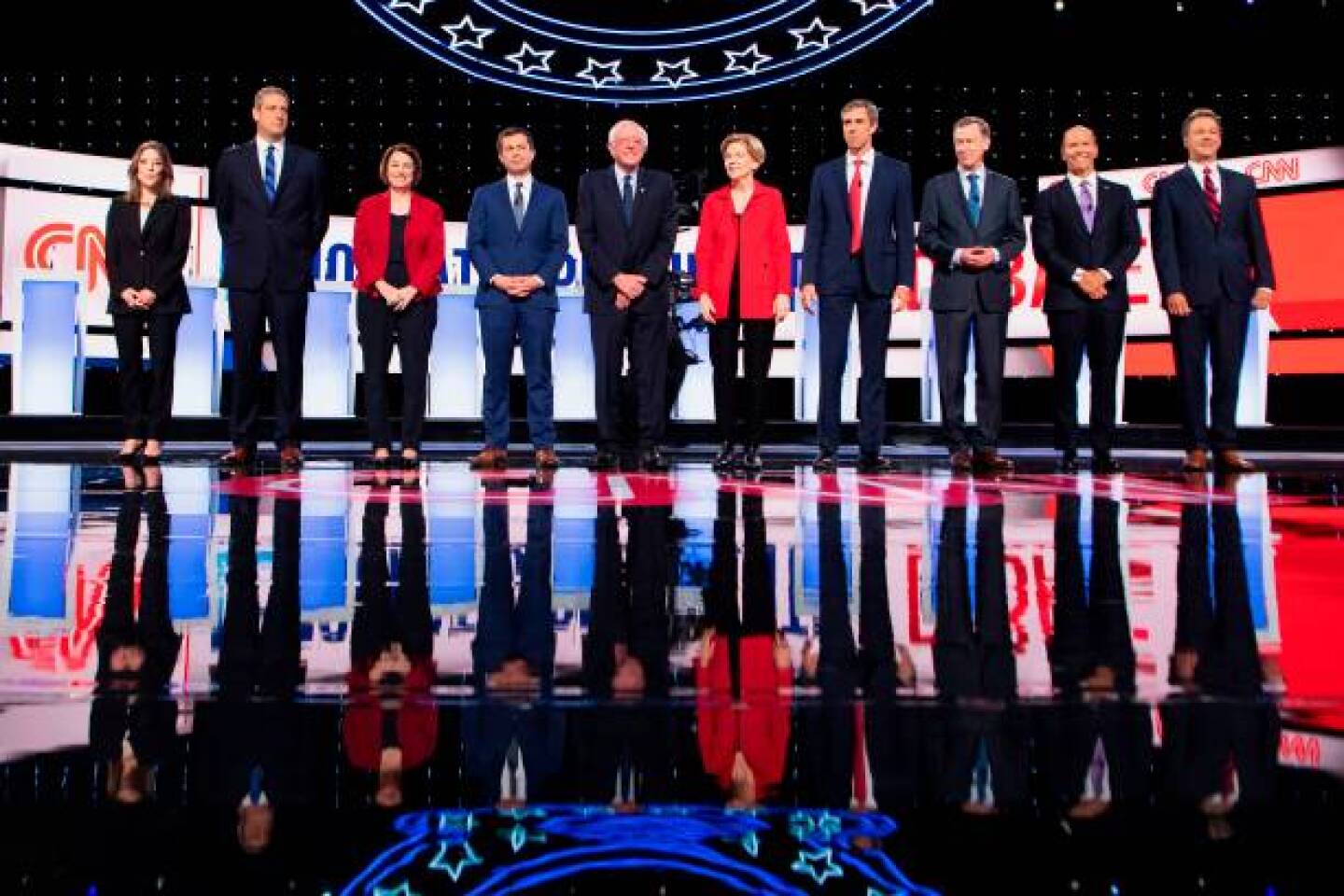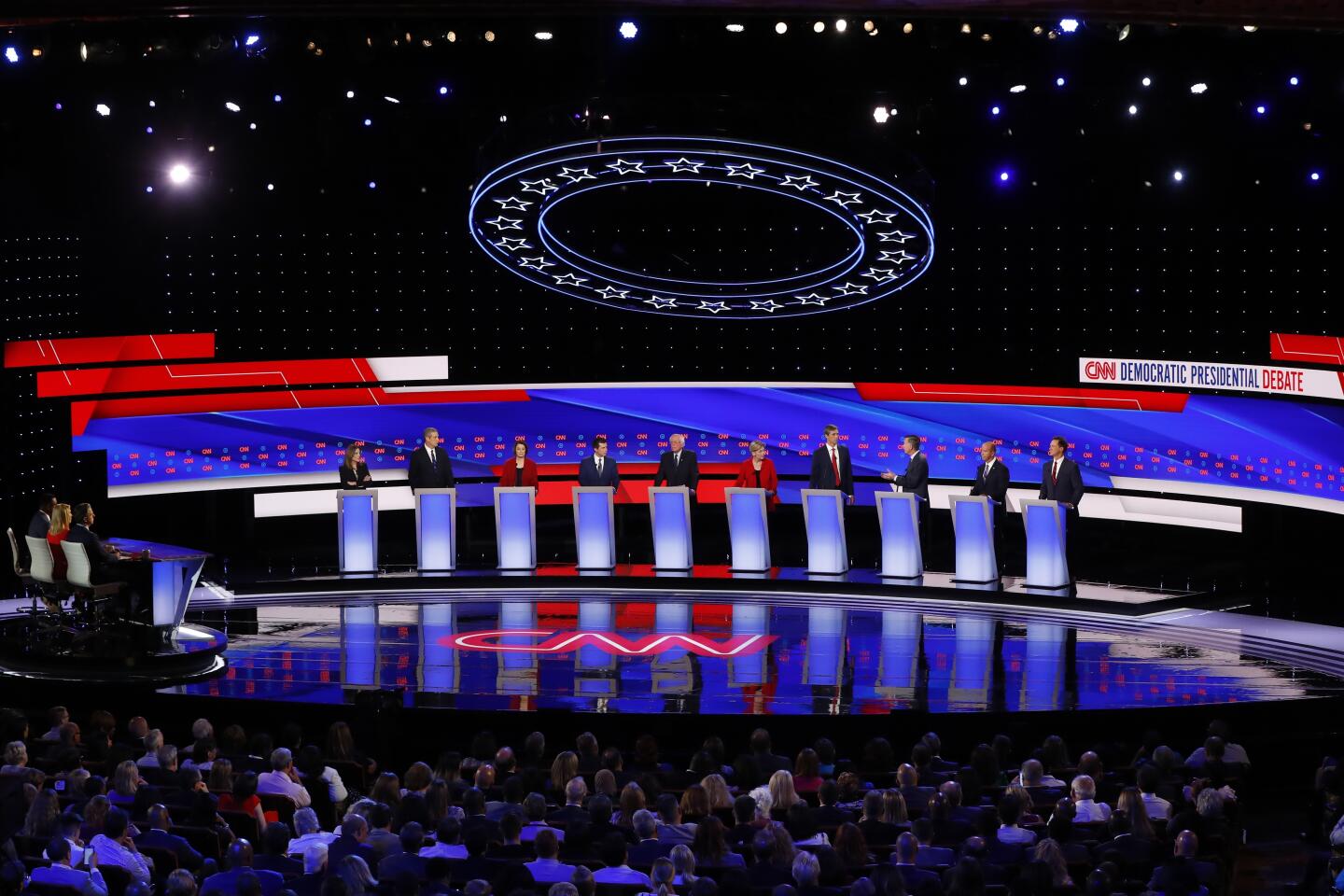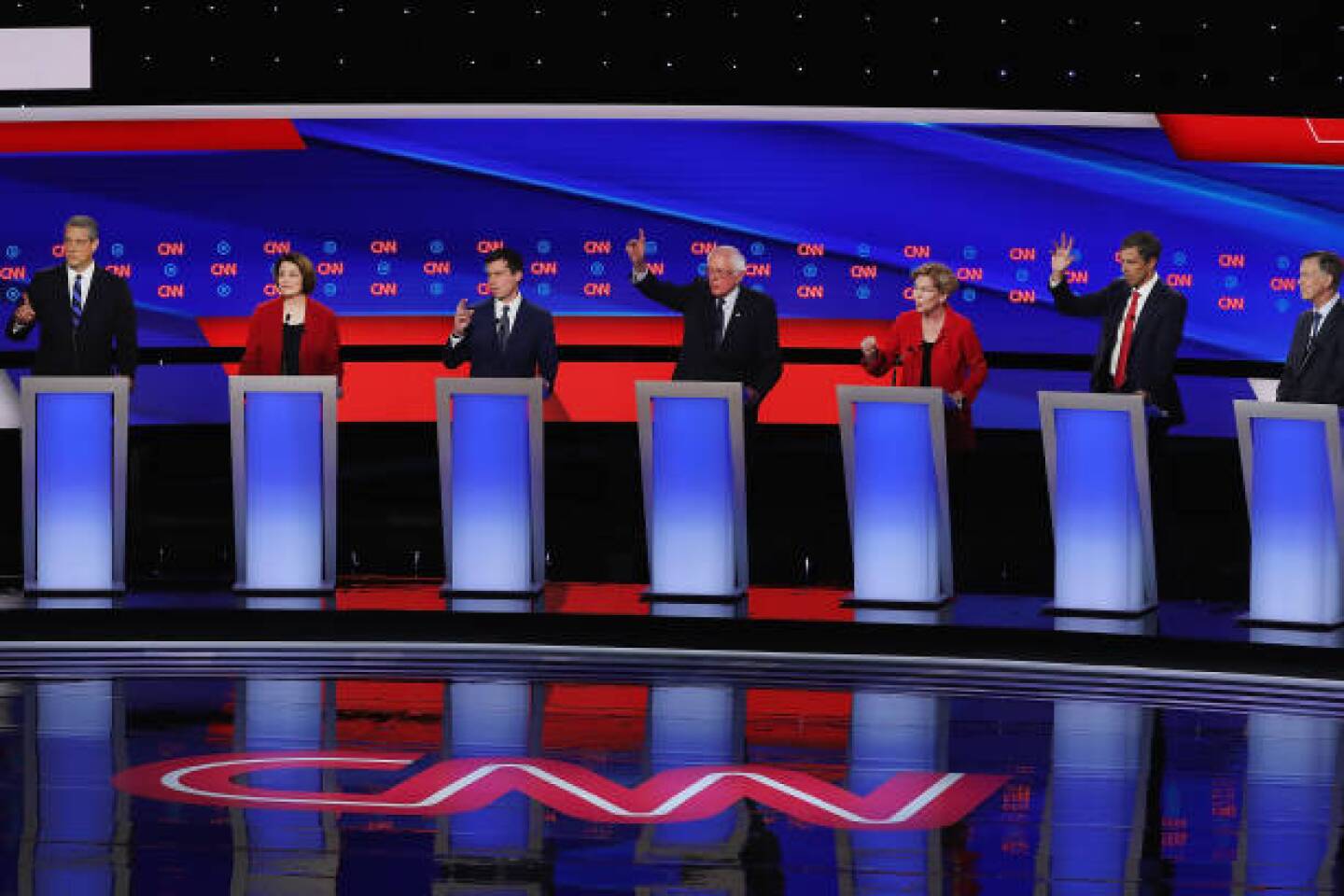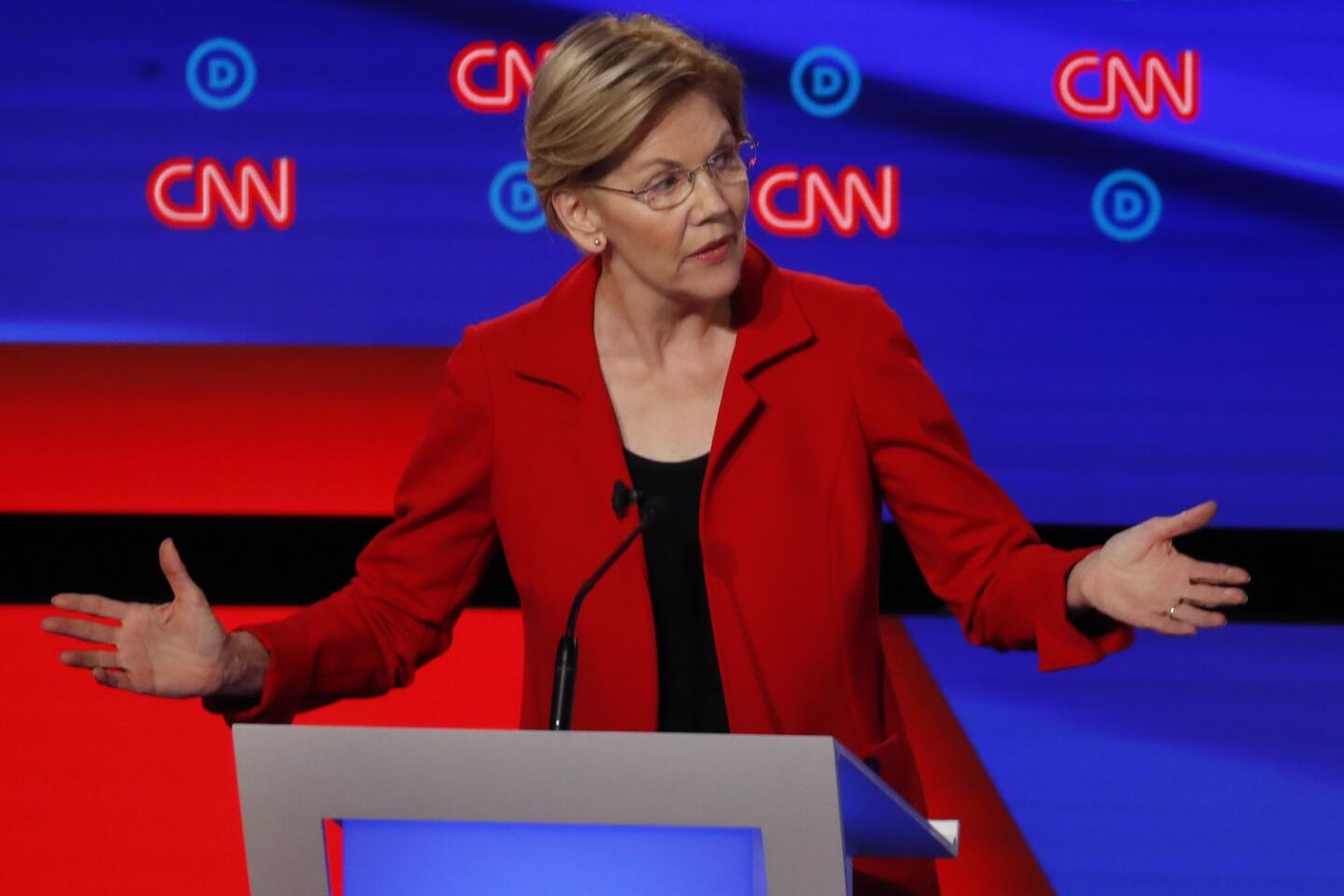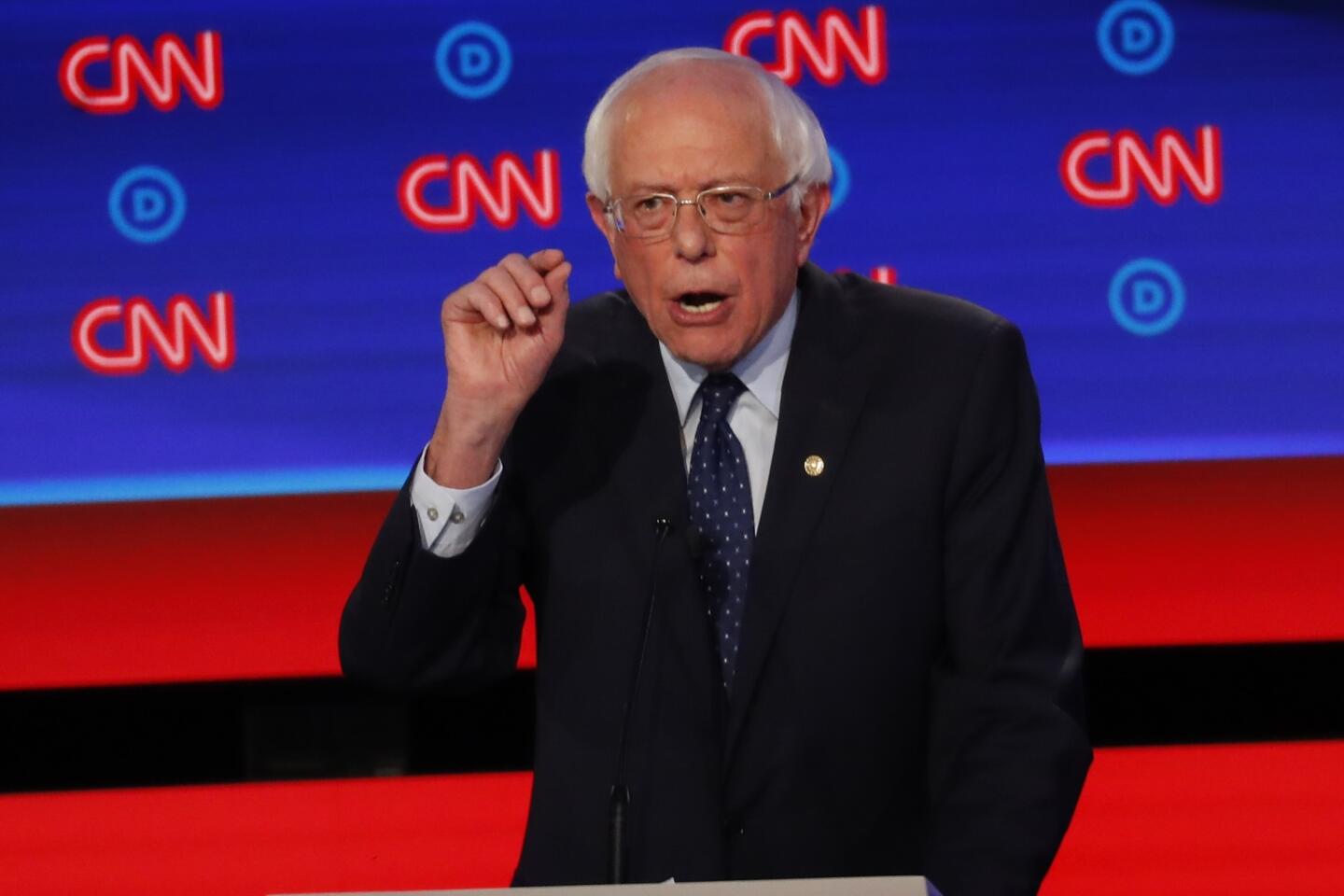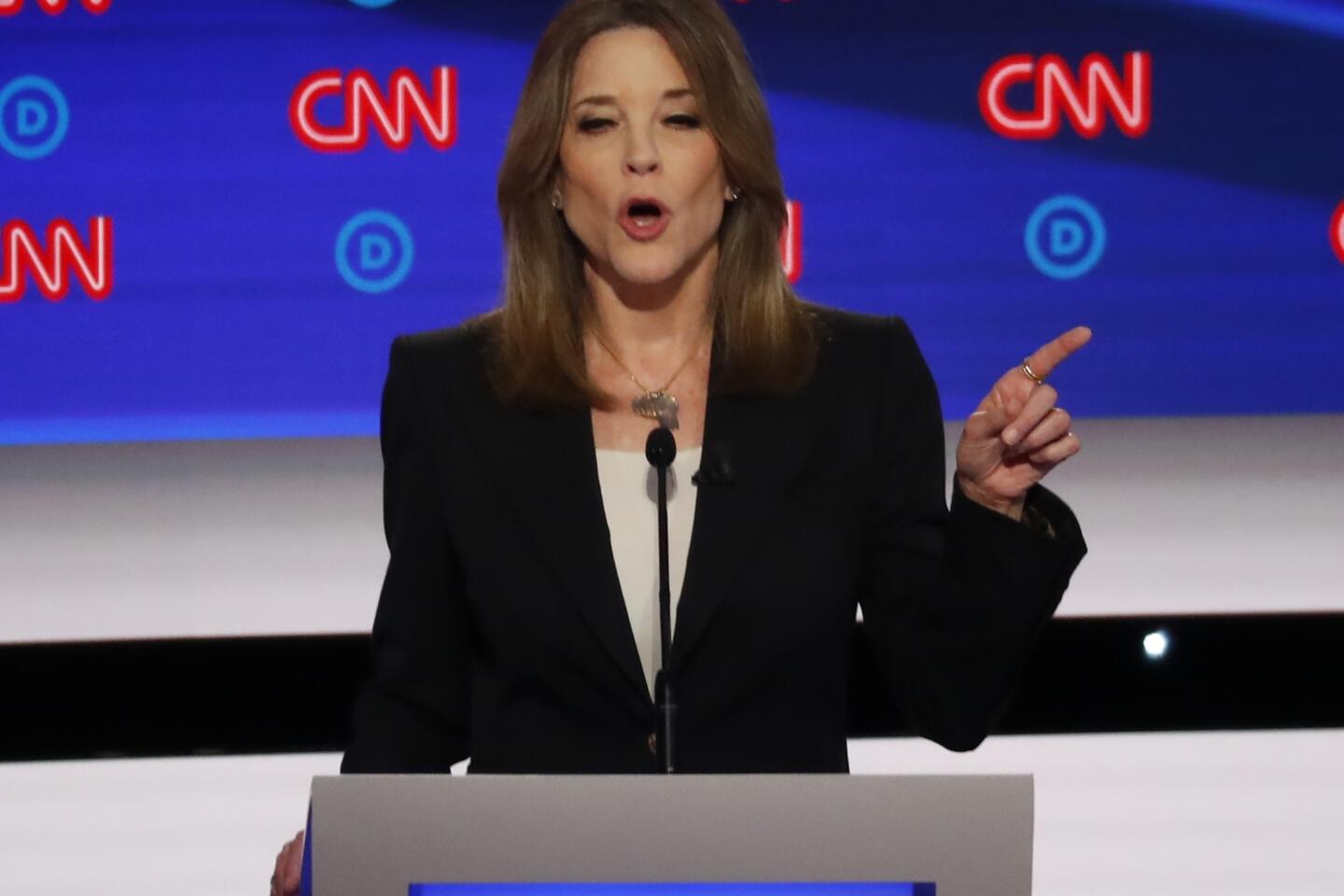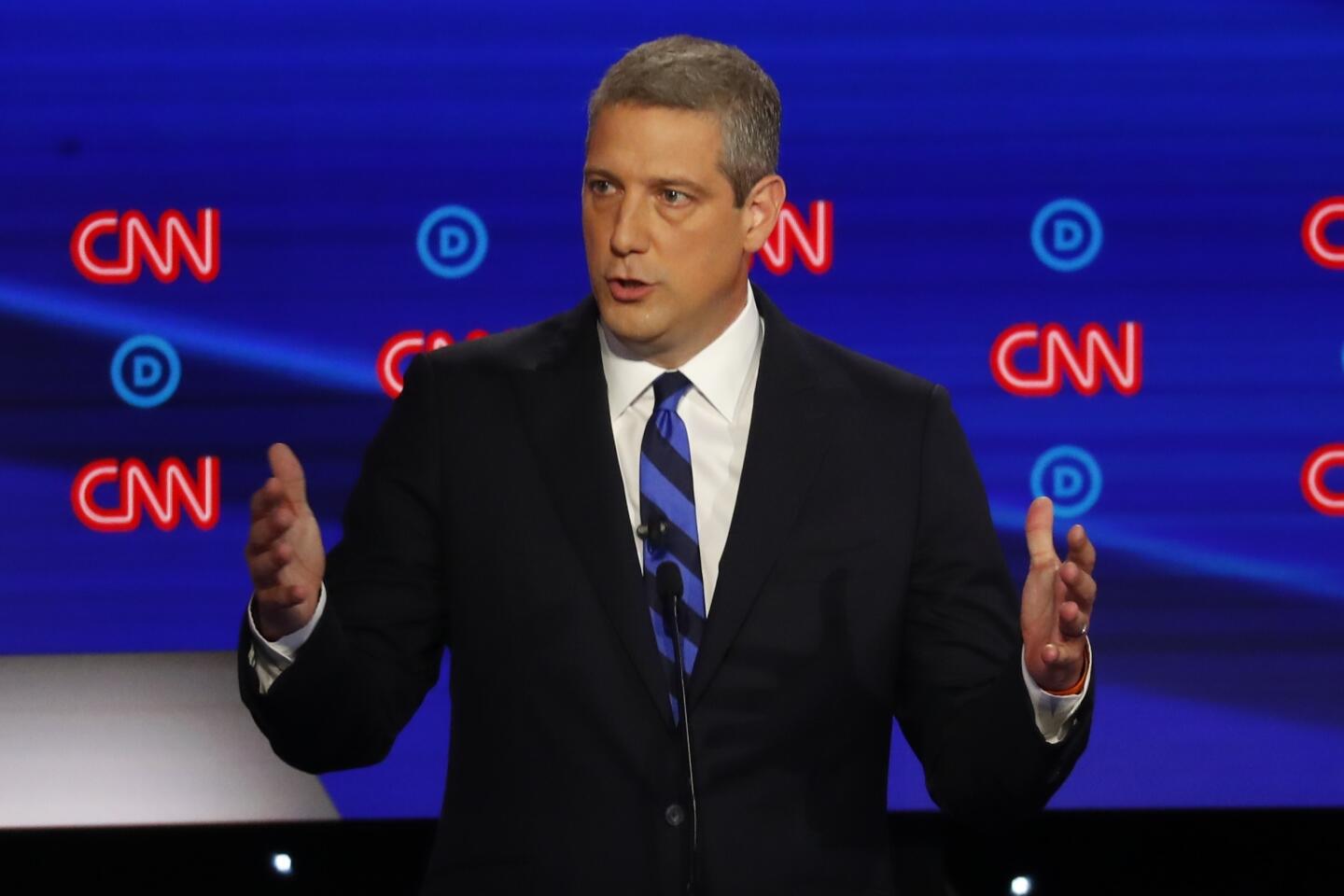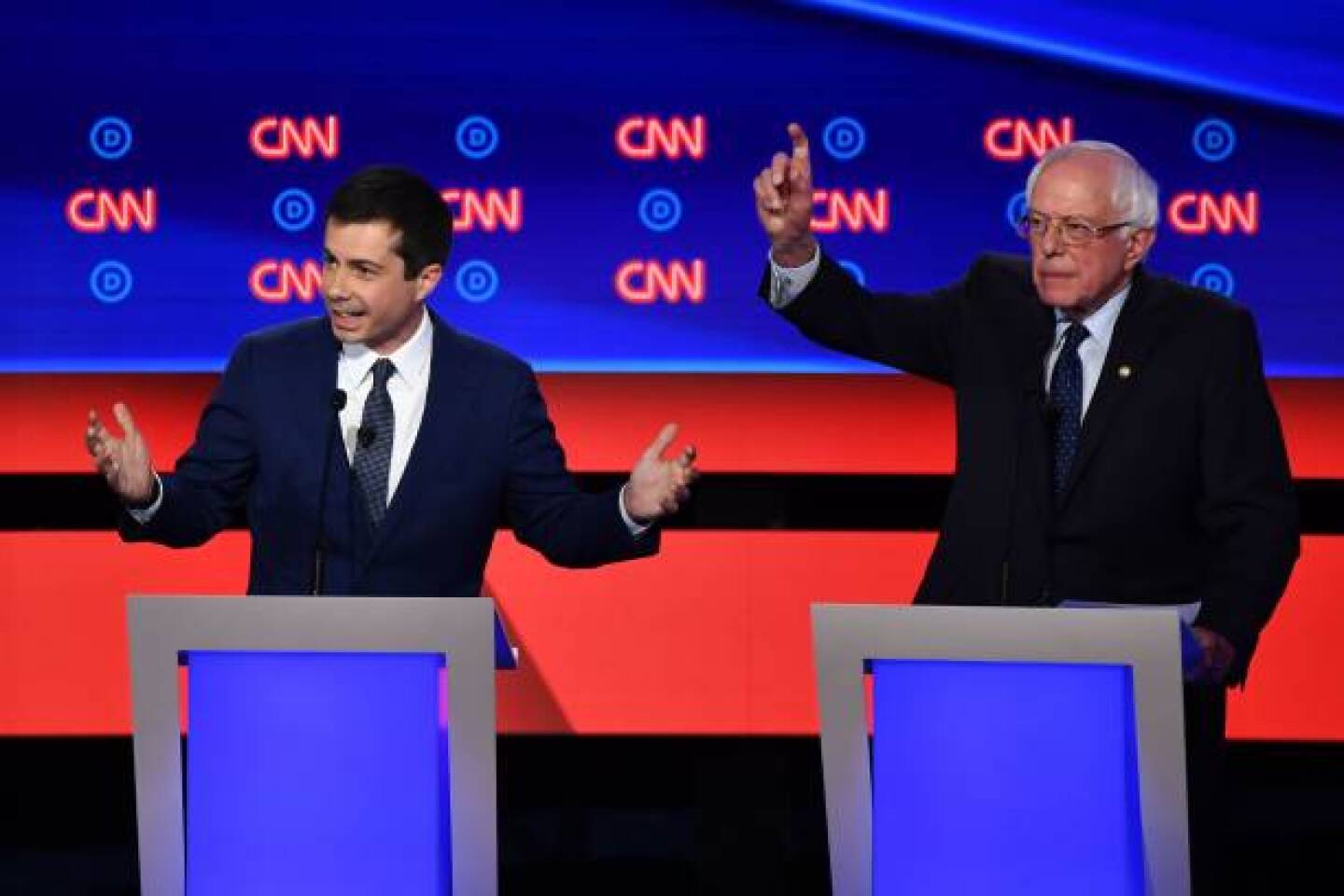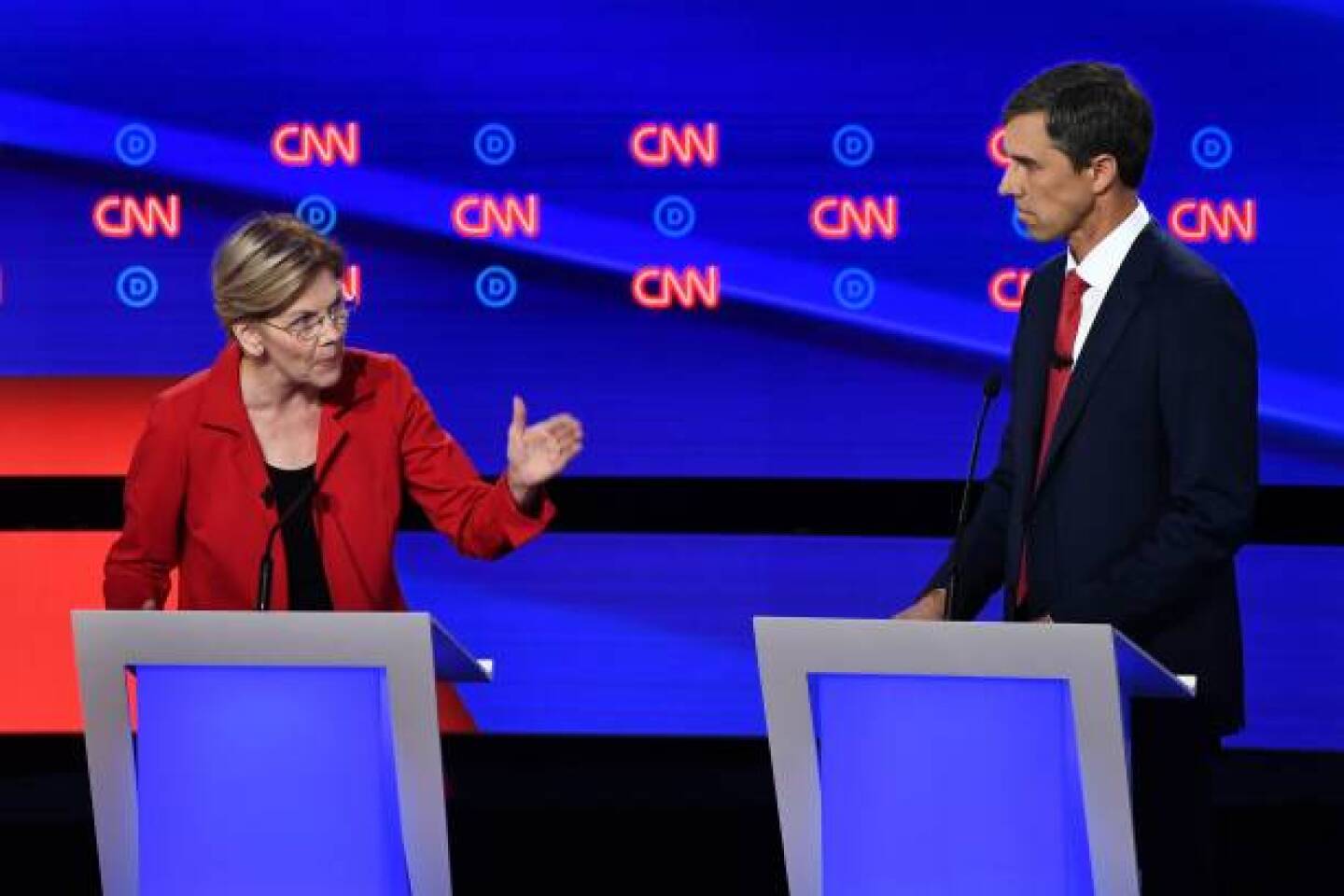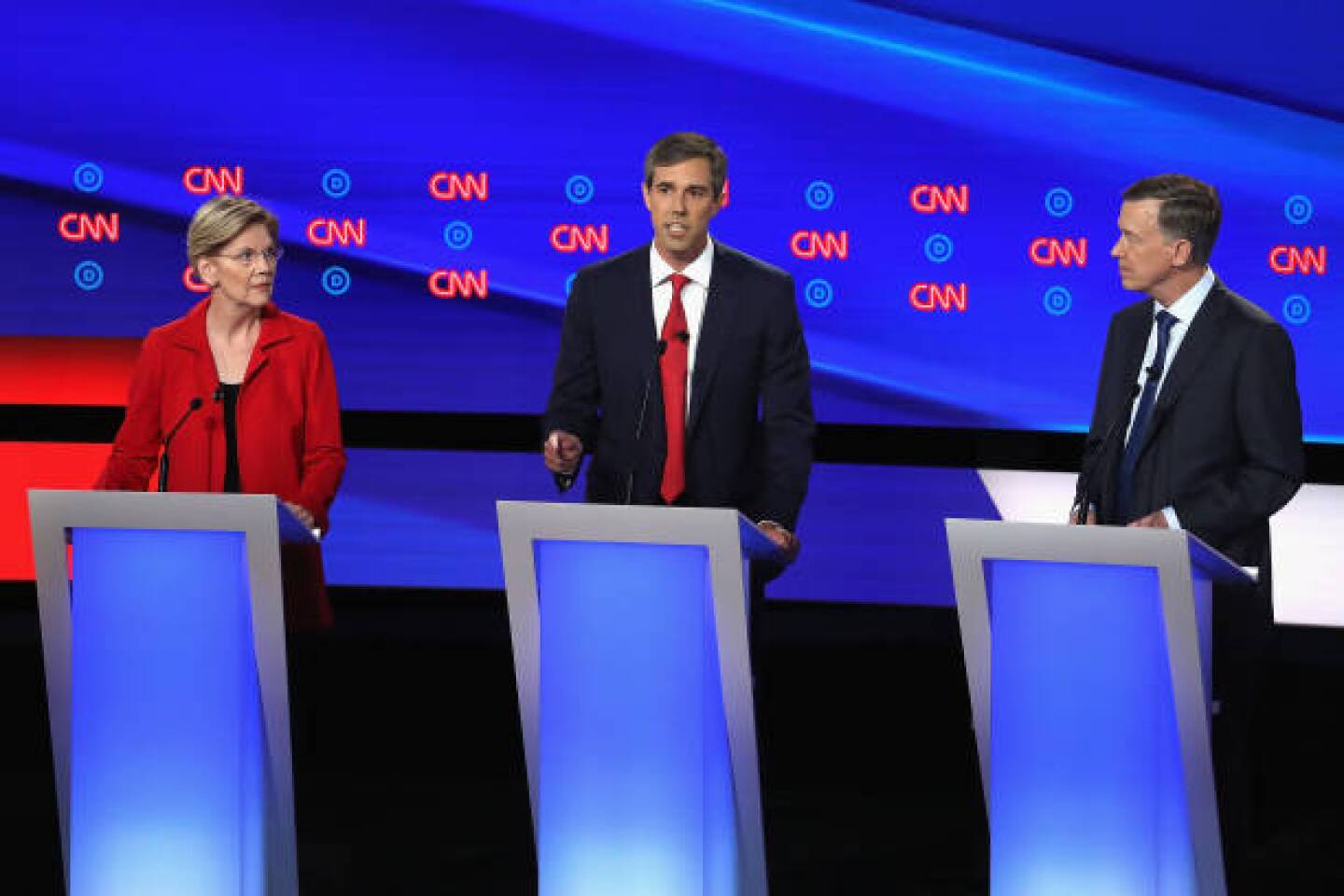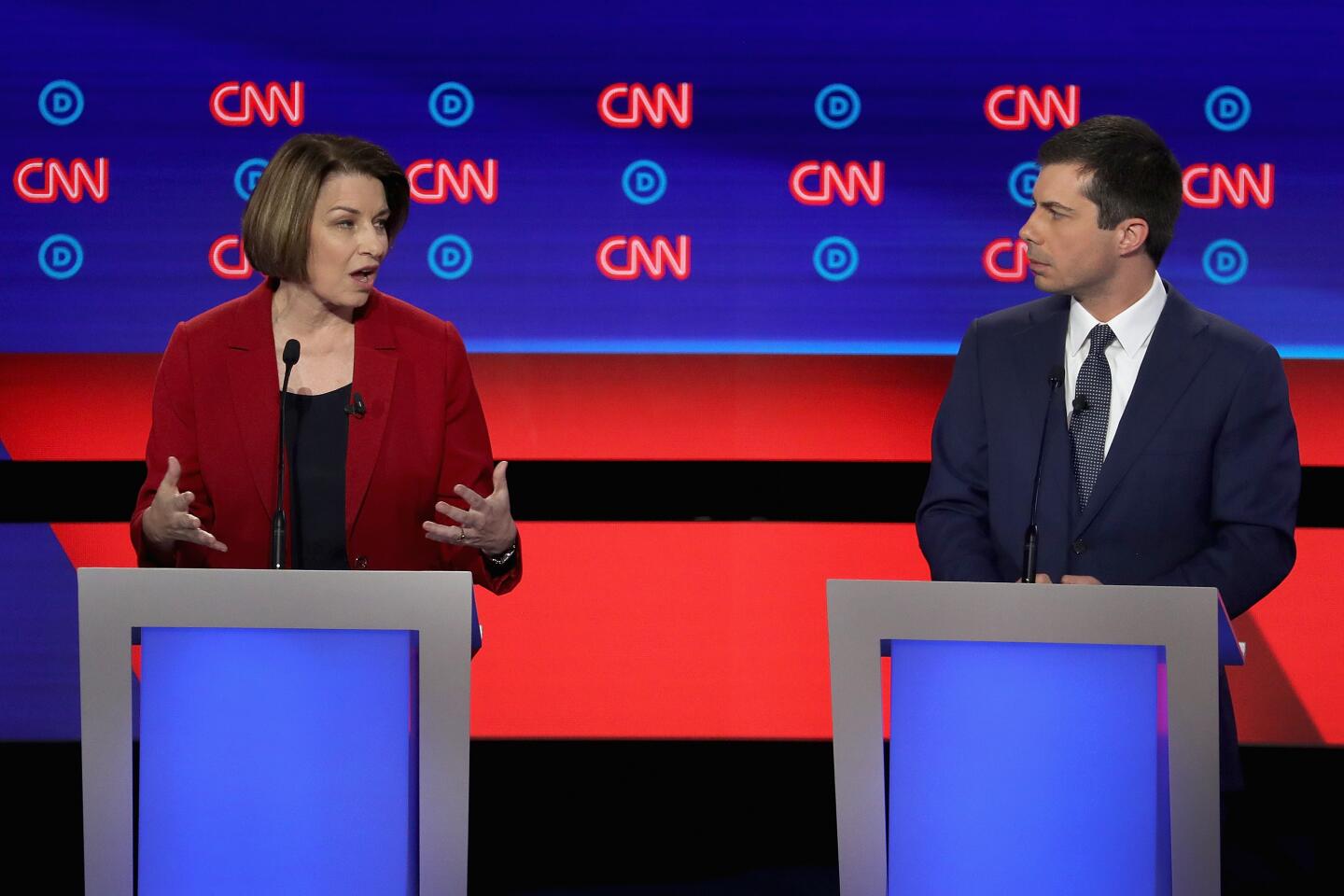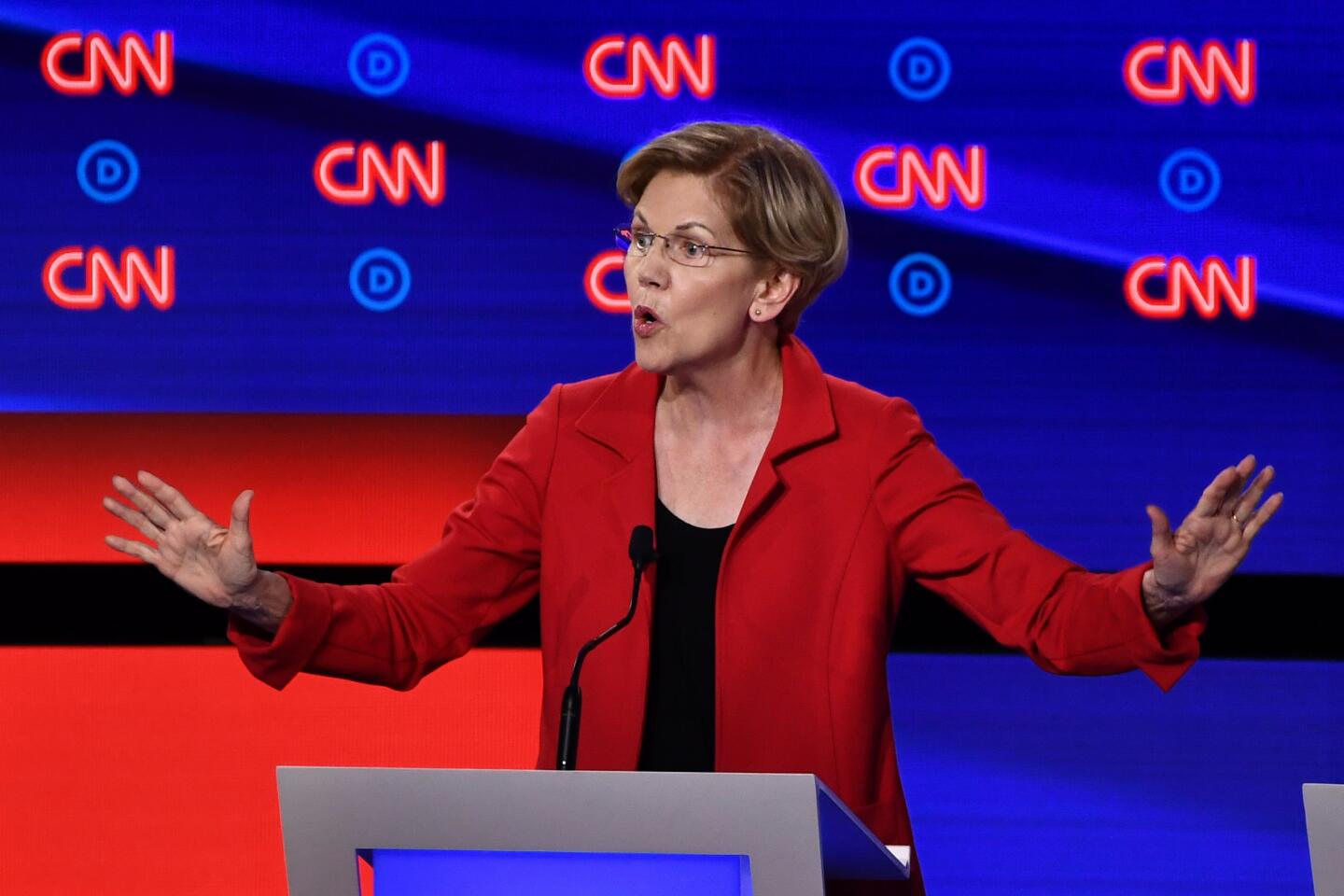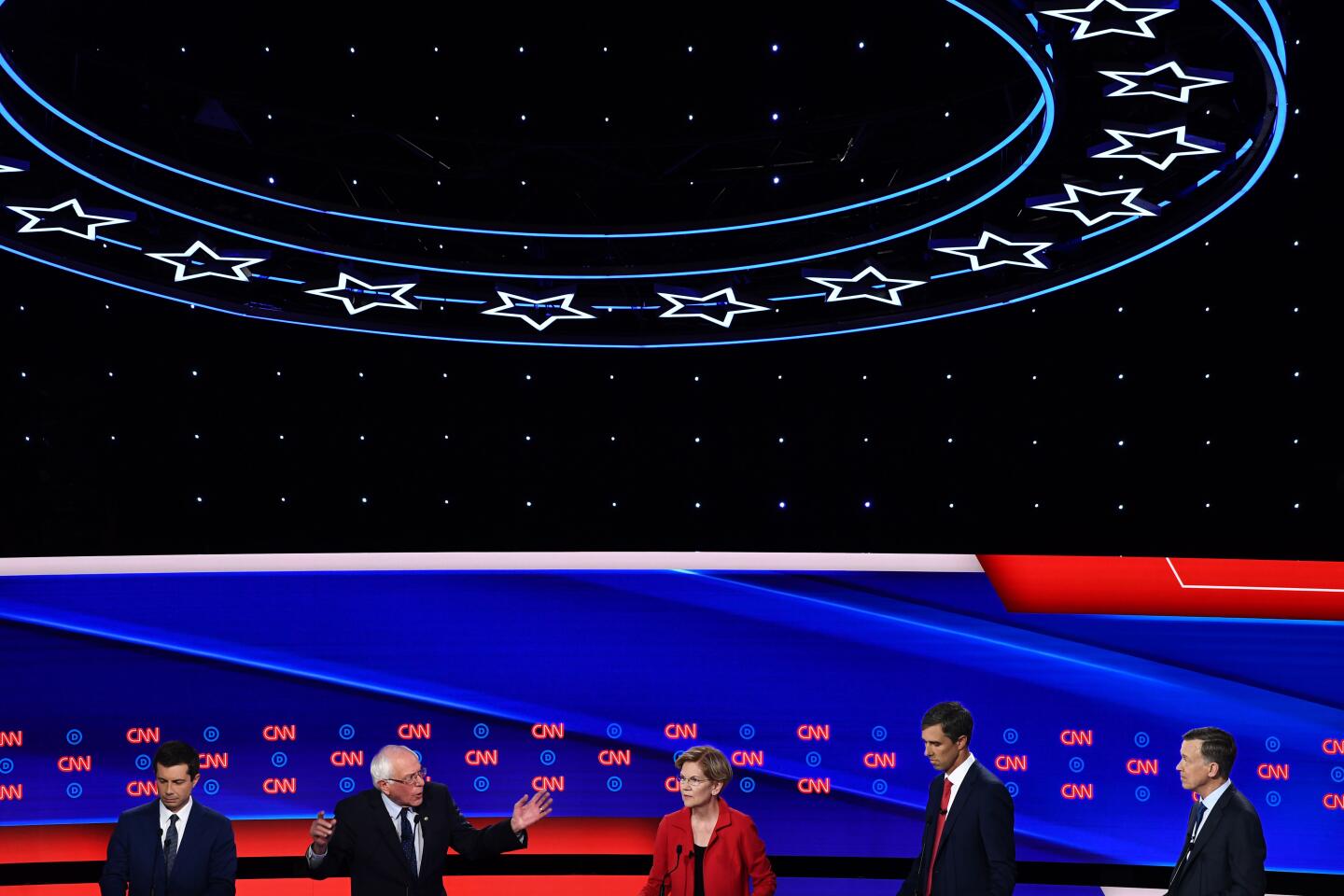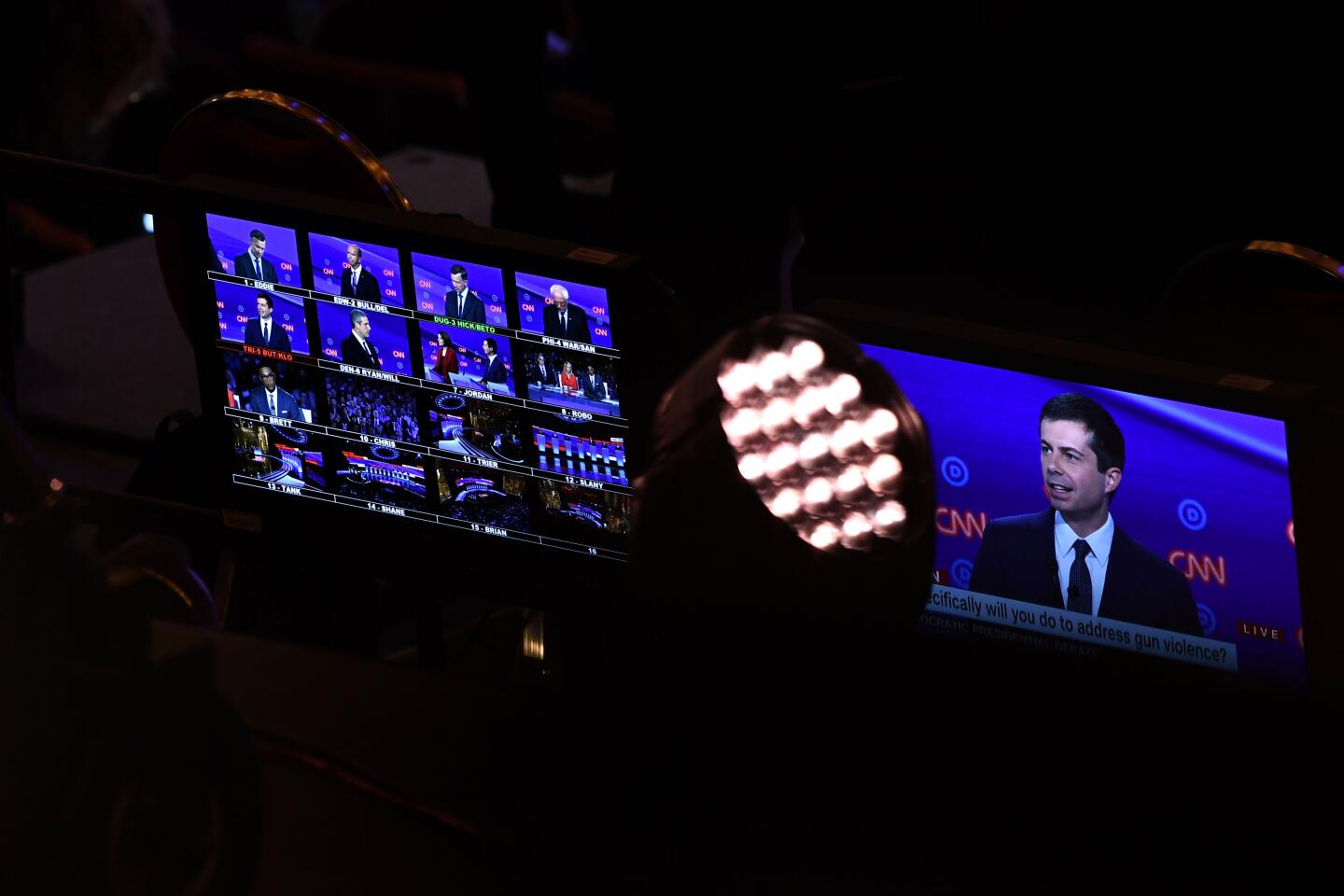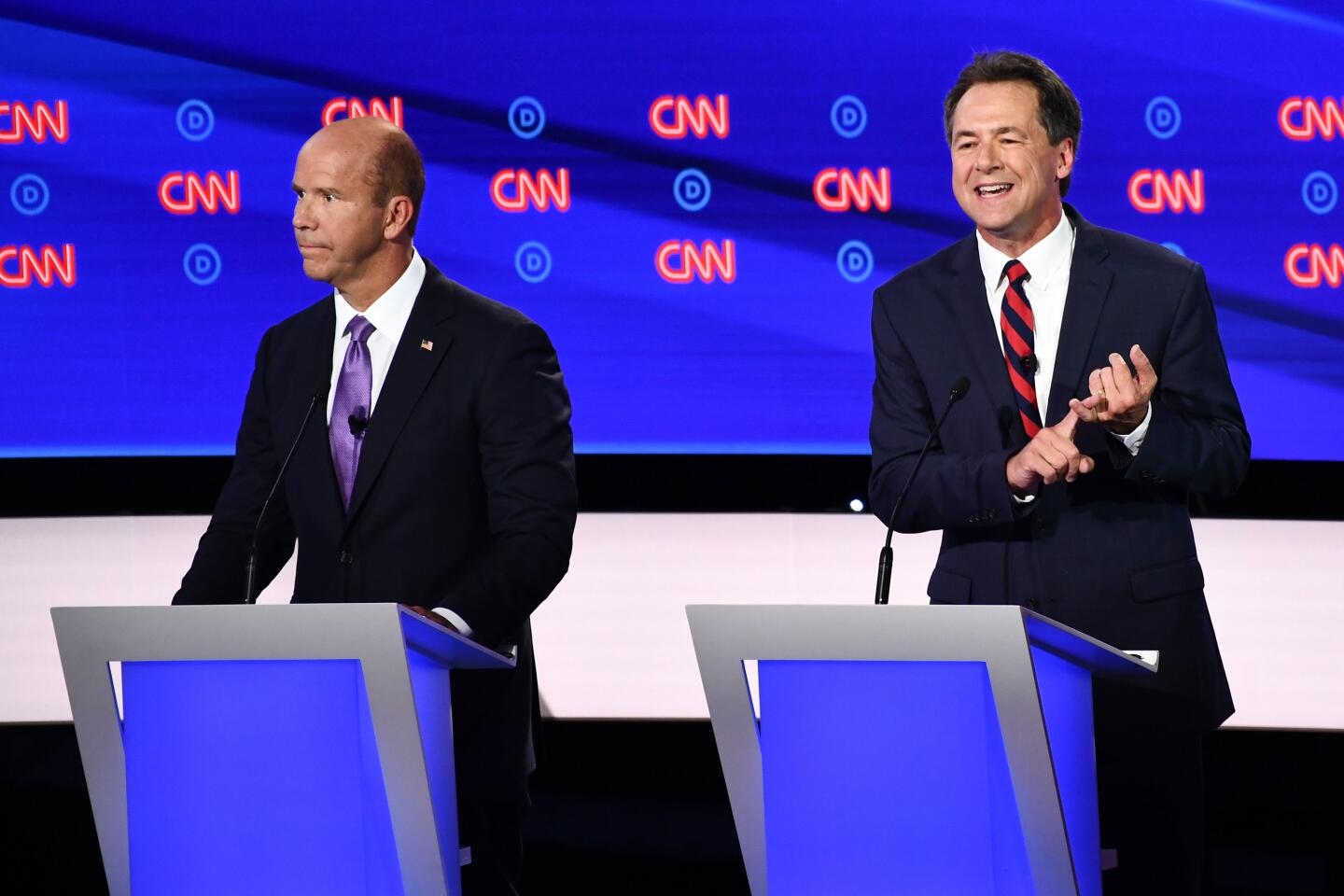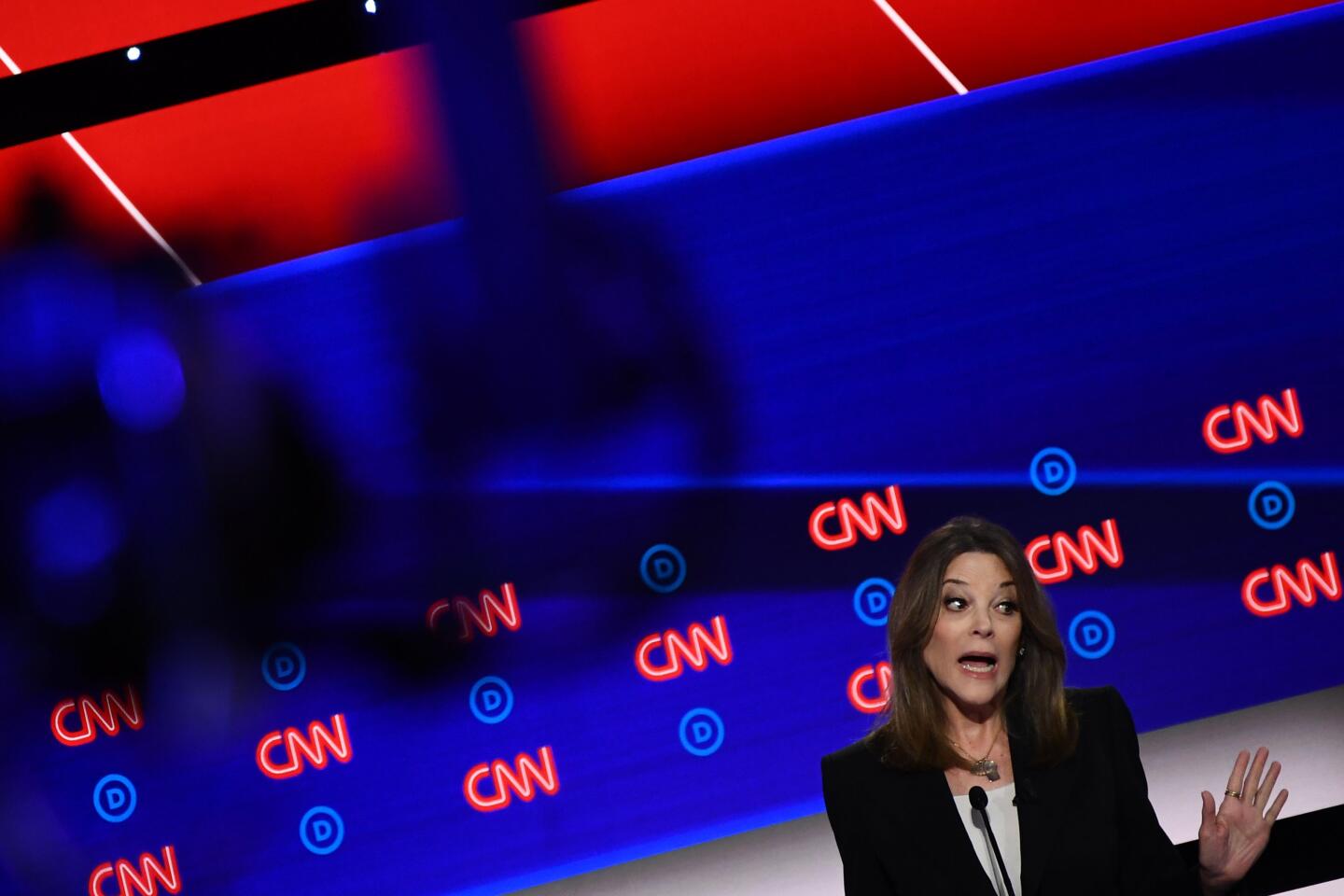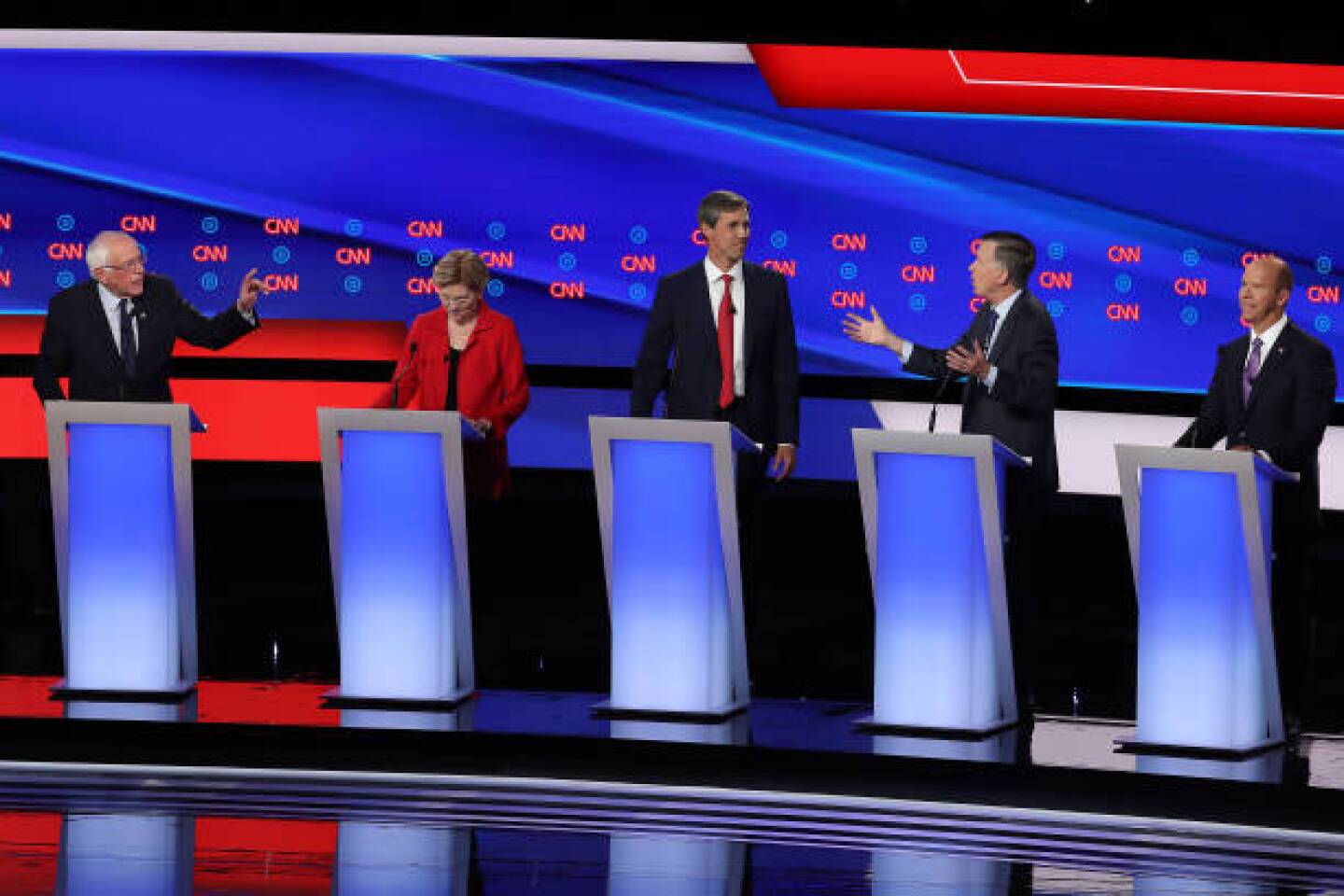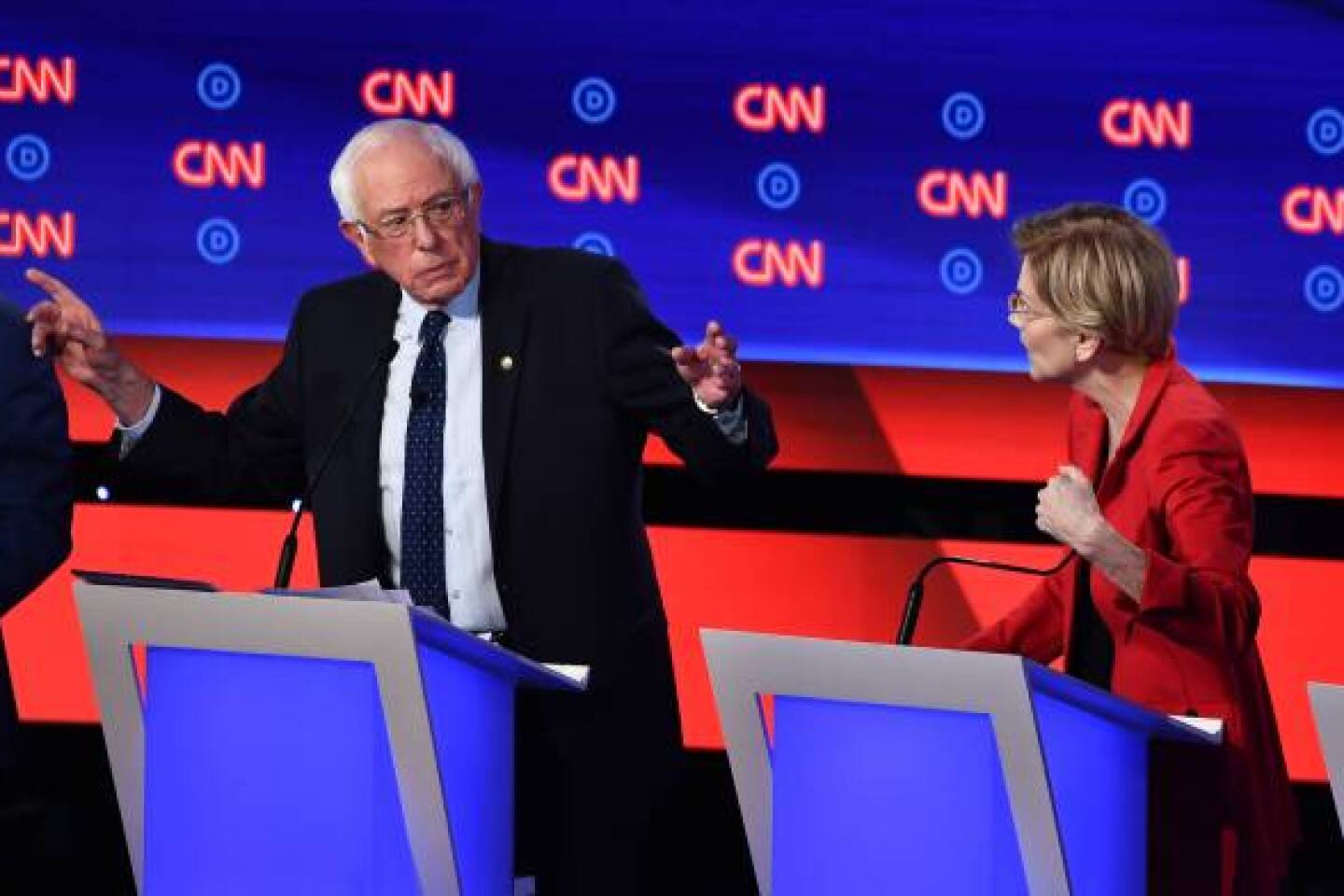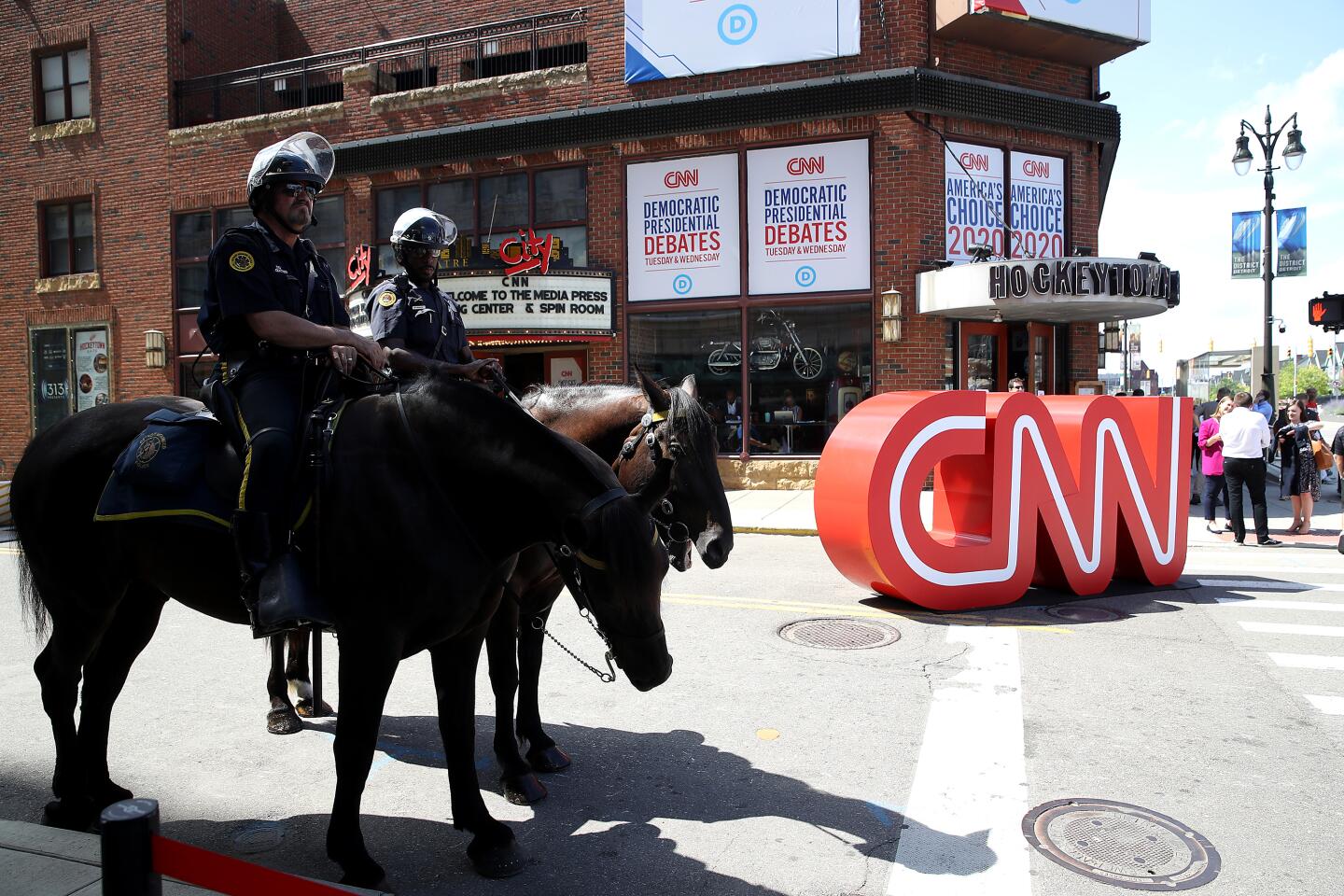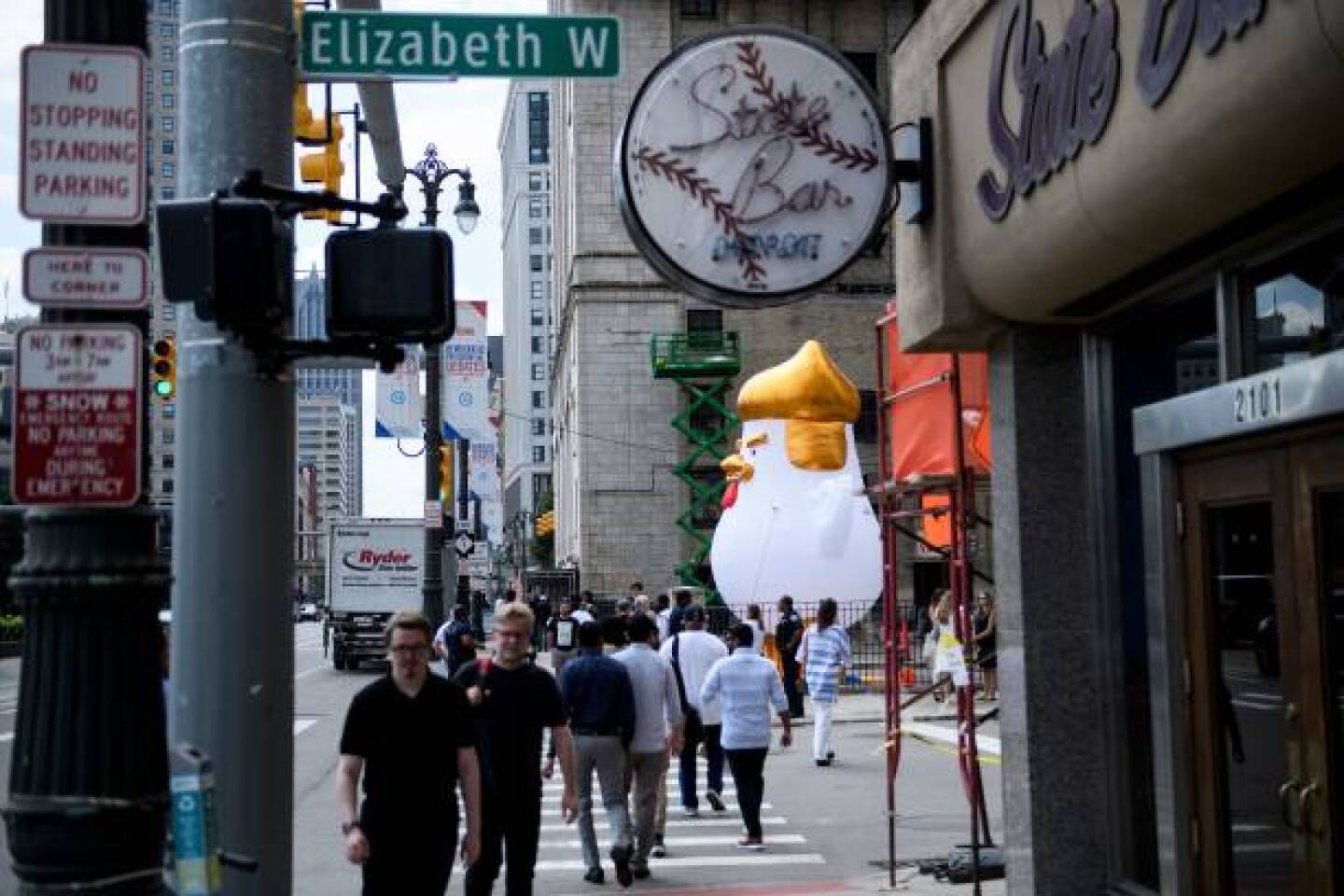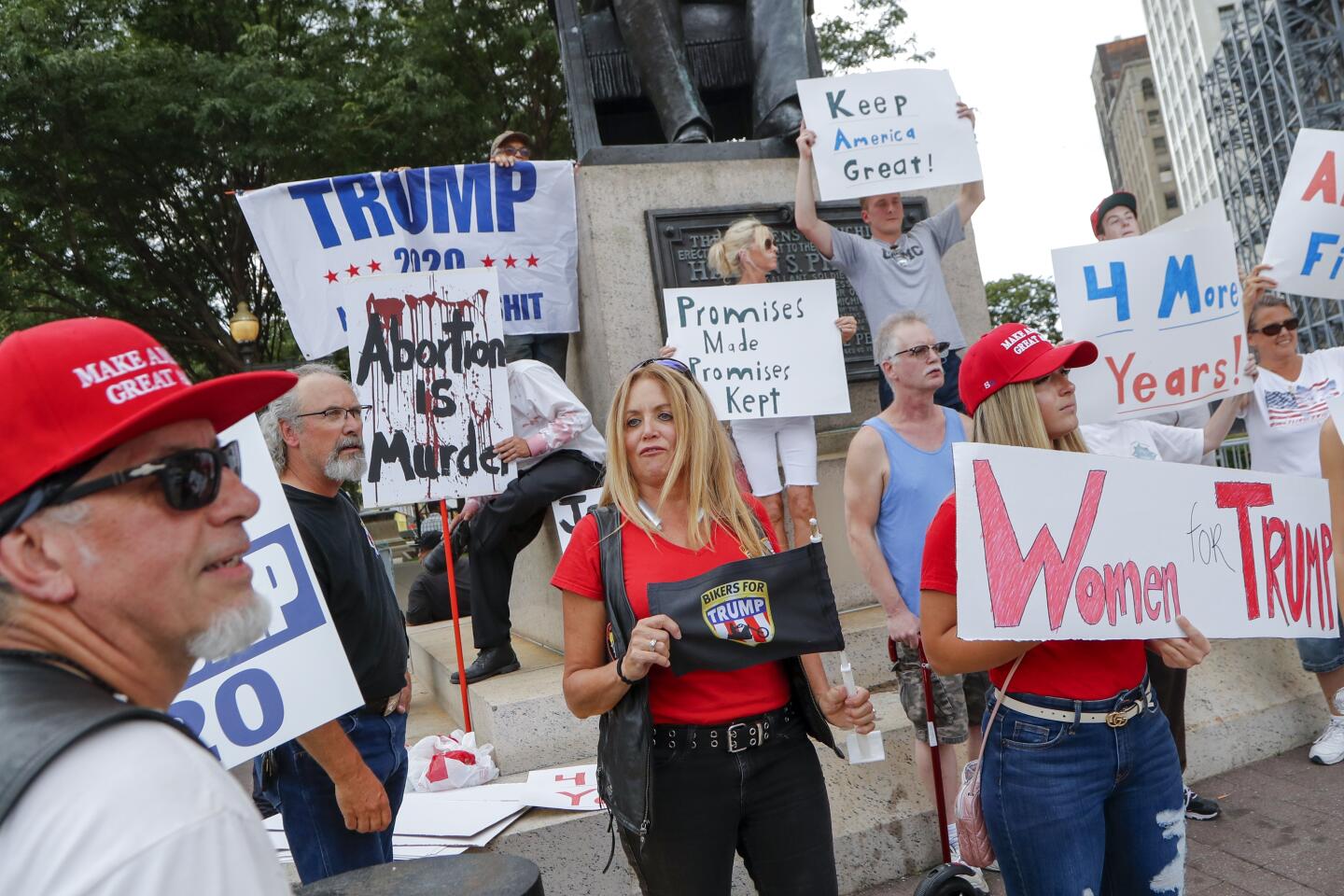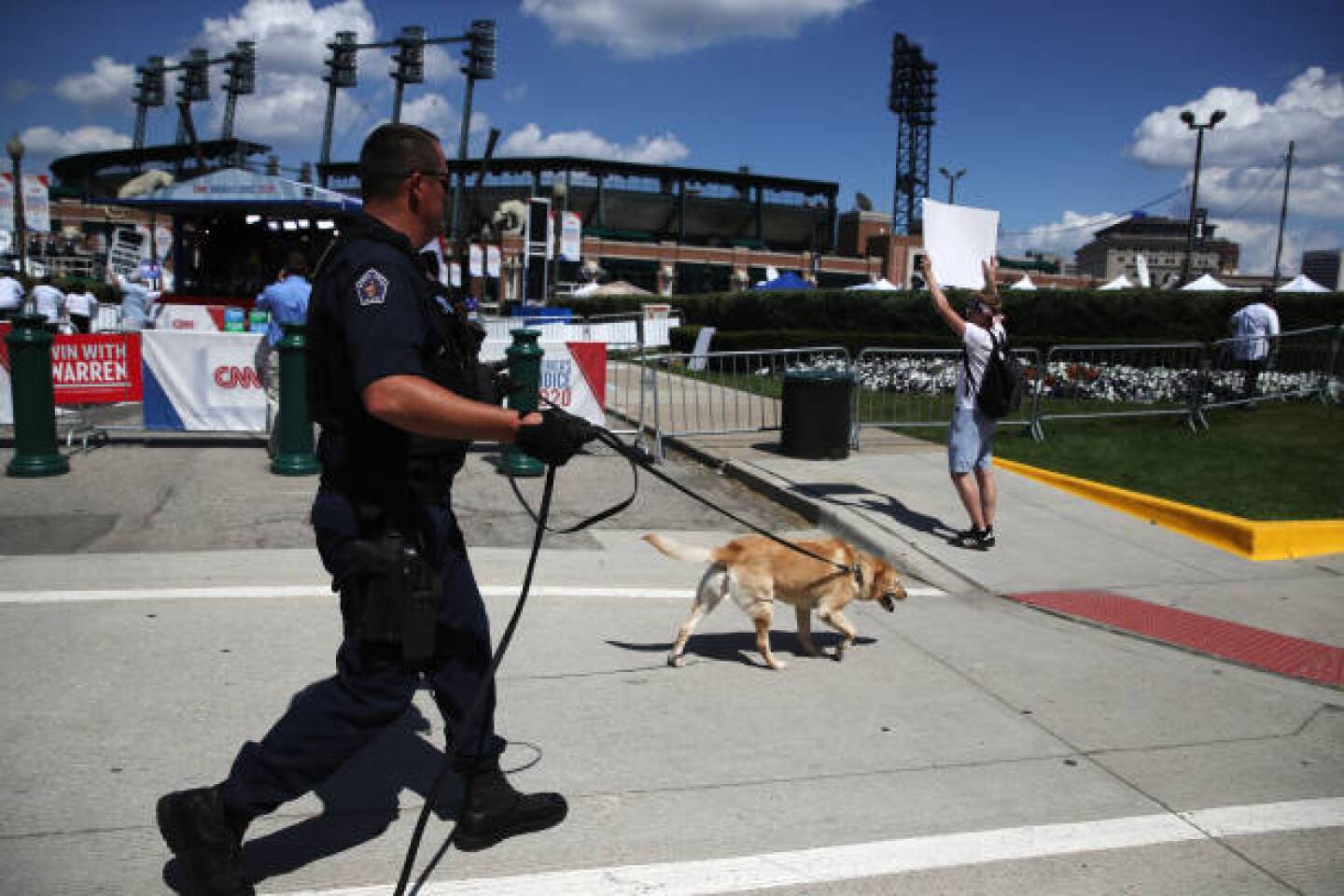Democratic progressives Bernie Sanders and Elizabeth Warren slapped back against moderate rivals who ridiculed “Medicare for All” during a fierce Democratic presidential debate Tuesday night.
Here are our 6 big takeaways from Night 1 of the debates in Detroit>>
- Share via
Warren’s wealth tax plan would ding Delaney. Here’s how he responded
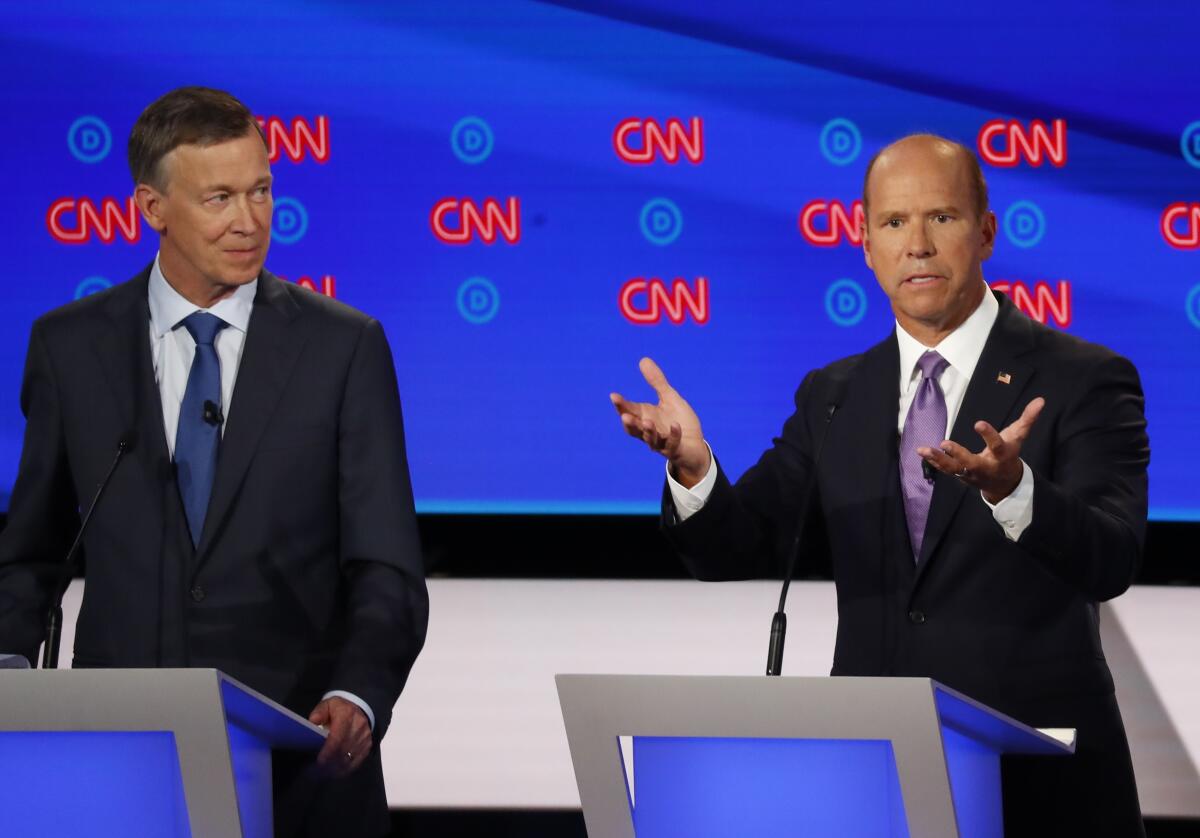
One of Elizabeth Warren’s presidential rivals served as a live model in Tuesday’s Democratic debate for her plan to tax the wealth of Americans with fortunes of more than $50 million.
CNN anchor Don Lemon asked her opponent John Delaney, a former Maryland congressman who struck it rich in healthcare, what he thought of Warren’s wealth tax plan. Lemon said Delaney’s net worth was estimated to exceed $65 million.
Delaney said he agreed taxes on the rich should rise but suggested the capital gains tax would be a better target.
“We don’t need to come up with new taxes that are arguably unconstitutional,” he said.
Warren rubbed her hands as she waited to respond.
“Your first $50 million, you can keep free and clear,” she told Delaney. “But your 50-million-and-first dollar, you’ve got to pitch in 2 cents,” she said.
With a 2% tax on fortunes above $50 million, she said, the U.S. could fund universal child care for children up to 5 years old, universal pre-K education, higher wages for all preschool teachers and universal tuition-free college.
- Share via
Candidates take shots at Warren’s ‘wealth tax’ proposal
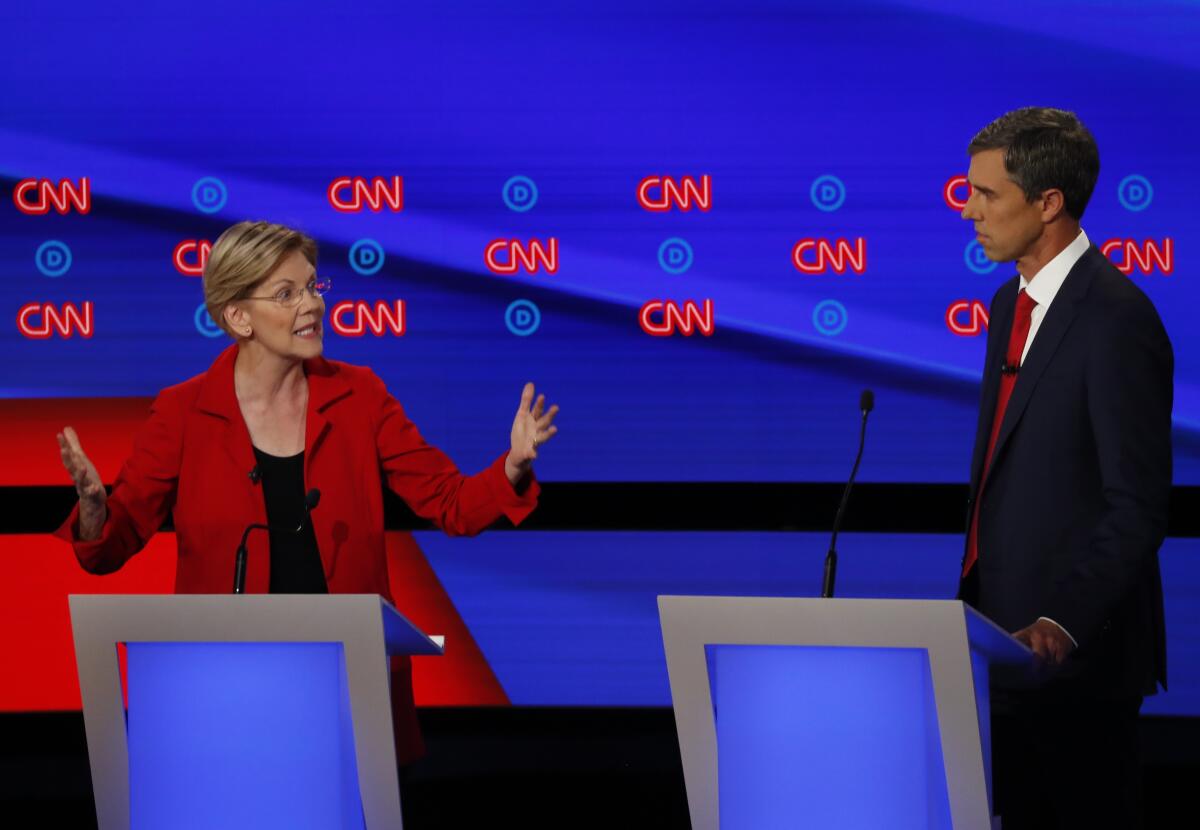
The debate also reflected a pool of candidates who have grown a lot less polite in their disagreements over how aggressively to tax the wealthy, and how far to spread the wealth from those taxes.
Massachusetts Sen. Elizabeth Warren talked up her “wealth tax,” which she says would raise enough money to pay for free college tuition, college debt forgiveness, universal pre-K education, universal childcare and other programs with a new levy on the nation’s wealthiest families, for example.
But others on the stage pushed back. They argued that the proposed tax may be unconstitutional and similar attempts in other nations fell short, leaving their governments to abandon them.
Minnesota Sen. Amy Klobuchar, former Texas congressman Beto O’Rourke and South Bend Mayor Pete Buttigieg said the vision Warren and Vermont Sen. Bernie Sanders share for free four-year public college for all is fundamentally unfair.
“My problem with some of these plans is they literally would pay for wealthy kids, for Wall Street kids to go to college,” Klobuchar said.
- Share via
Sanders, Warren and Buttigieg lead debate speaking time
- Share via
How Flint is still recovering, years after the water crisis
- Share via
Has the private sector helped or hurt Detroit? Delaney and Sanders disagree
Nearly 90 minutes into the debate, the candidates brought up the problems of the city they were in, Detroit.
Former Maryland Rep. John Delaney cited the city as an example of the good things that can happen with the private sector and the government work together.
Vermont Sen. Bernie Sanders disagreed, blaming private sector outsourcing to other countries for leaving Detroit “nearly destroyed” due to job losses.
- Share via
Candidates share personal stories on gun violence
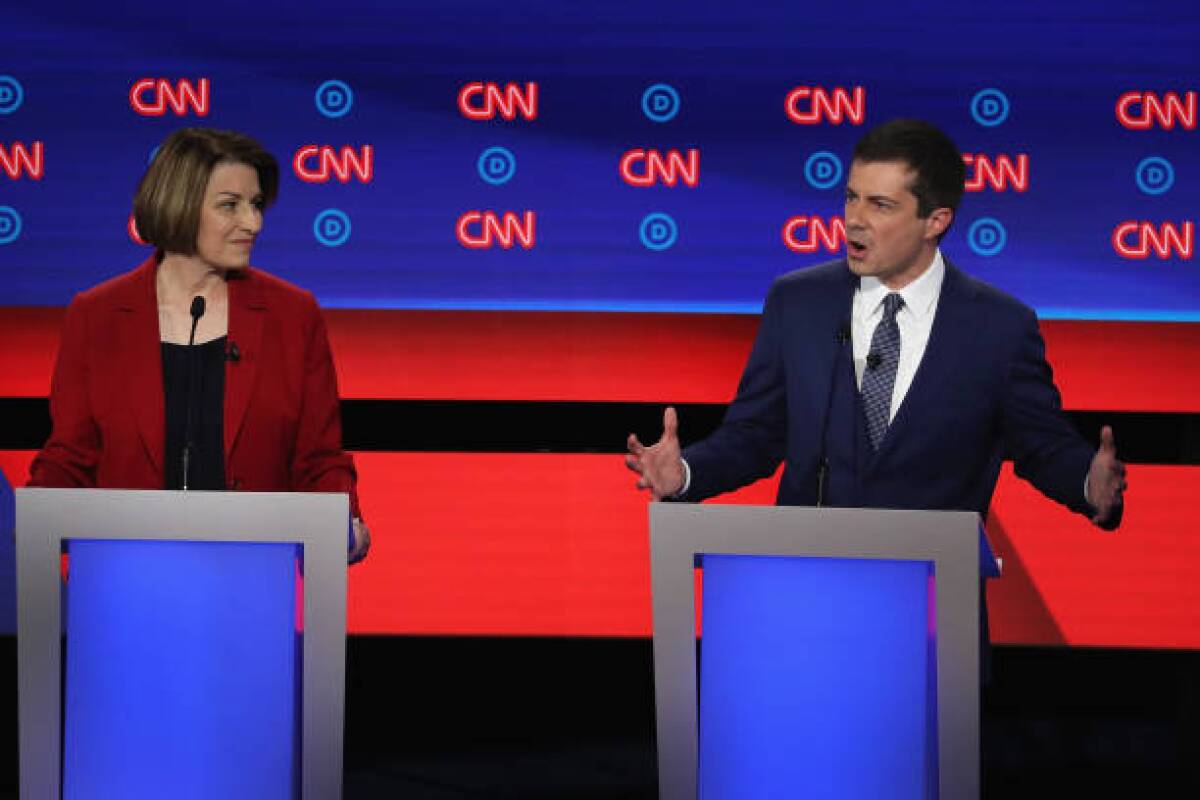
Gun control used to be a radioactive subject for Democrats, but tonight’s slate of candidates sounded the most unified they’d been all night as they largely agreed on the need for tougher gun laws, including a new assault weapons ban.
Several candidates touched on their personal experiences with gun violence and their frustrations in trying to fight for tougher regulations.
“It’s the worst part of being mayor,” said South Bend, Ind., Mayor Pete Buttigieg, whose city is plagued by gun violence, and who noted that he was in high school in 1999 during the mass shooting at Columbine High School in Colorado. “High school is hard enough without having to worry if you’re going to get shot.”
Former Colorado Gov. John Hickenlooper recalled visiting the movie theater in Aurora where a gunman massacred moviegoers in 2012.
Montana Gov. Steve Bullock said he had an 11-year-old nephew, Jeremy, who was shot and killed on a playground.
This is part of the reason why Democrats have grown increasingly emboldened to take aggressive stands on gun control: Years and years of mass shootings have outraged the public and driven a rise in liberal activism to call for tougher laws.
And unlike the 2008 presidential primary debate between Barack Obama and Hillary Clinton, when the candidates tried to avoid looking too liberal on gun control, some of tonight’s candidates, Sen. Bernie Sanders of Vermont and Bullock, were instead asked about past positions when they seemed more conservative on gun control.
Sanders responded by bragging about his D-minus grade from the National Rifle Assn., which was public enemy No. 1 for the candidates on stage, who used the group to also push for campaign finance reform.
“This is about the NRA,” said Sen. Amy Klobuchar of Minnesota, recalling how she met with President Trump after the school shooting massacre in Parkland, Fla. “I watched and wrote down when nine times he said he wanted universal background checks.”
The next day, Trump met with the NRA, and the president “folds” on the policy, Klobuchar said. “I will not fold.”
- Share via
Warren fires back at Delaney
“I don’t understand why anybody goes to all the trouble of running for president of the United States to talk about what we really can’t do and shouldn’t fight for.”
— Sen Elizabeth Warren of Massachusetts
- Share via
Democrats split on decriminalizing border crossings
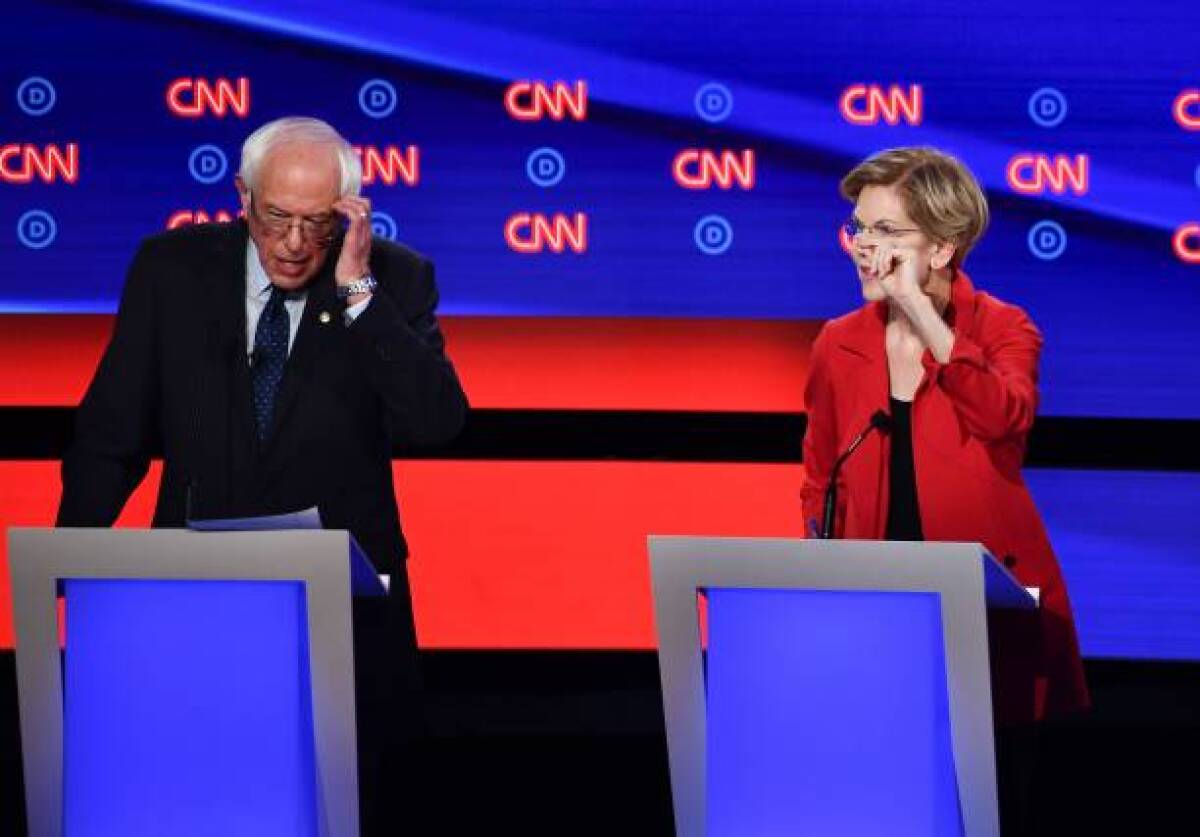
Democratic candidates debating Tuesday in Detroit were split on whether to decriminalize border crossings by migrants who lack permission to enter the United States.
“We cannot make it a crime when someone comes here,” Massachusetts Sen. Elizabeth Warren said.
The law that makes some border crossings a crime, rather than a civil violation, has enabled President Trump to have migrant children separated from their parents, she argued.
A few others — former Texas Rep. Beto O’Rourke, former Colorado Gov. John Hickenlooper and Ohio Rep. Tim Ryan — rejected the idea of decriminalizing border crossings.
“I expect that people who come here follow our laws,” said O’Rourke, adding that the U.S. should reserve the right to prosecute immigrants who enter the country illegally.
For his part, Vermont Sen. Bernie Sanders joined Warren in backing decriminalization, and he denied his proposed surge in federal spending on healthcare and higher education would encourage illegal immigration.
“I happen to believe that when I talk about healthcare as a human right, that applies to all people in this country,”
- Share via
Democratic debate 2019: Scenes from Detroit
- Share via
Centrist candidates attack Warren, Sanders over ‘Medicare for all’ plans
The Democratic divide over how to make healthcare more affordable was on full display from the first minutes of the debate, as centrist candidates took aim at “Medicare for all” plans championed by Sens. Bernie Sanders of Vermont and Elizabeth Warren of Massachusetts.
Former Maryland Rep. John Delaney, Montana Gov. Steve Bullock, Minnesota Sen. Amy Klobuchar, Ohio Rep. Tim Ryan and other candidates warned that millions of American workers and union members with job-based health benefits would lose their coverage under a Medicare for all plan.
“We don’t have to be the party of subtraction,” Delaney cautioned, suggesting instead that Democrats should allow Americans to have a choice of government coverage or commercial insurance.
Many Democrats, including former Vice President Joe Biden, are pushing for a so-called “public option” that would allow Americans who don’t like their commercial health plan to buy into a government plan.
But Sanders and Warren vigorously defended their plans to replace all health coverage in the U.S. with a single government plan modeled on Medicare, arguing it is the only way to assure that patients are not hit with medical bills they can’t afford.
And they blasted their critics for raising the specter of widespread disruptions in a move to a national health plan. “Stop using Republican talking points,” Warren charged.
- Share via
Buttigieg: ‘It’s time to stop worrying about what the Republicans will say’
“It’s time to stop worrying about what the Republicans will say. If we embrace a far-left agenda, they’re going to say we’re a bunch of crazy socialists. If we embrace a conservative agenda ... they’re going to say we’re a bunch of crazy socialists.”
— Pete Buttigieg
- Share via
Trump supporters rally outside Fox Theatre
- Share via
Ranch dressing in salsa? Mayor Pete explains himself
When Democratic presidential hopeful Pete Buttigieg answered an audience question about whether he mixed salsa with ranch dressing at a rally this week, he had no idea his response would go viral.
So on Tuesday, a few hours before he took to the debate stage, he elaborated on his feelings about the mingling of condiments.
“I didn’t realize this would become one of my most controversial statements,” Buttigieg told The Times. “… Obviously, salsa is salsa and ranch is ranch, but if someone’s going to mix them up, I’m not above dipping a tortilla chip in that and enjoying the mix of flavors.”
Listen to his full response:
- Share via
Tom Steyer won’t be on the stage tonight. But he’ll still reach viewers
San Francisco billionaire Tom Steyer won’t be on the stage in Detroit tonight or tomorrow – by jumping into the presidential race just three weeks ago, he left himself little time to qualify for this round of debates.
But he’s managed to dip his toe into the proceedings, at least marginally, through paid advertisements. A “Tom 2020” commercial aired about 30 minutes before the big show began, and it’ll be interesting to see if he’s ponied up for more prime ad time later tonight.
Steyer has used his considerable wealth to get his face and name on the airwaves for a while. His “Need to Impeach” campaign, urging Congress to impeach President Trump, included a considerable television ad buy – narrated and starring, naturally, Tom Steyer.
Tulsi Gabbard, the Democratic congresswoman from Hawaii, also ponied up for a pre-debate commercial on Tuesday to tout her candidacy. She, unlike Steyer, will be on the debate stage tomorrow night.
- Share via
It could be the end of the road for some candidates
At least half the candidates on tonight’s stage know they could be at their final debate of the campaign.
Starting in September, the Democratic National Committee ratchets up the qualification threshold: Candidates will have to have 130,000 donors and hit at least 2% in several polls.
So far, seven have hit those two marks. That includes the four leading candidates — Former vice president Joe Biden and Sens. Kamala Harris, Bernie Sanders and Elizabeth Warren. Also qualifying are Sen. Cory Booker, South Bend, Ind., Mayor Pete Buttigieg and former Rep. Beto O’Rourke. Andrew Yang, the tech entrepreneur, also says his campaign has hit the donor qualification number.
- Share via
Fox Theatre: ‘The most spectacular, over-the-top movie palace ever built’
Any of the Democratic presidential candidates hoping to stir up a little drama during tonight and tomorrow’s debates will have a fitting venue in Detroit’s historic Fox Theatre, once described as “the most spectacular, over-the-top movie palace ever built.”
When the 5,048-seat theater opened in 1928 as part of the Fox movie-house chain, it was the second-largest theater in the world, according to its website.
Decked out in a mix of Middle Eastern and Asian motifs, with a lobby that stretches for half a block and a vertical neon sign that spells out F-O-X, the theater is an essential part of the culture of the Motor City, lighting up busy Woodward Avenue in the center of town.
Motown’s Berry Gordy held his holiday revue here in the 1960s, featuring the likes of the Temptations and the Supremes. Its stage has also played host to Frank Sinatra, Prince, Cher and Bruce Springsteen.
Now the Democratic contenders will have a chance to make history here.
- Share via
Why Michigan is key to winning the White House
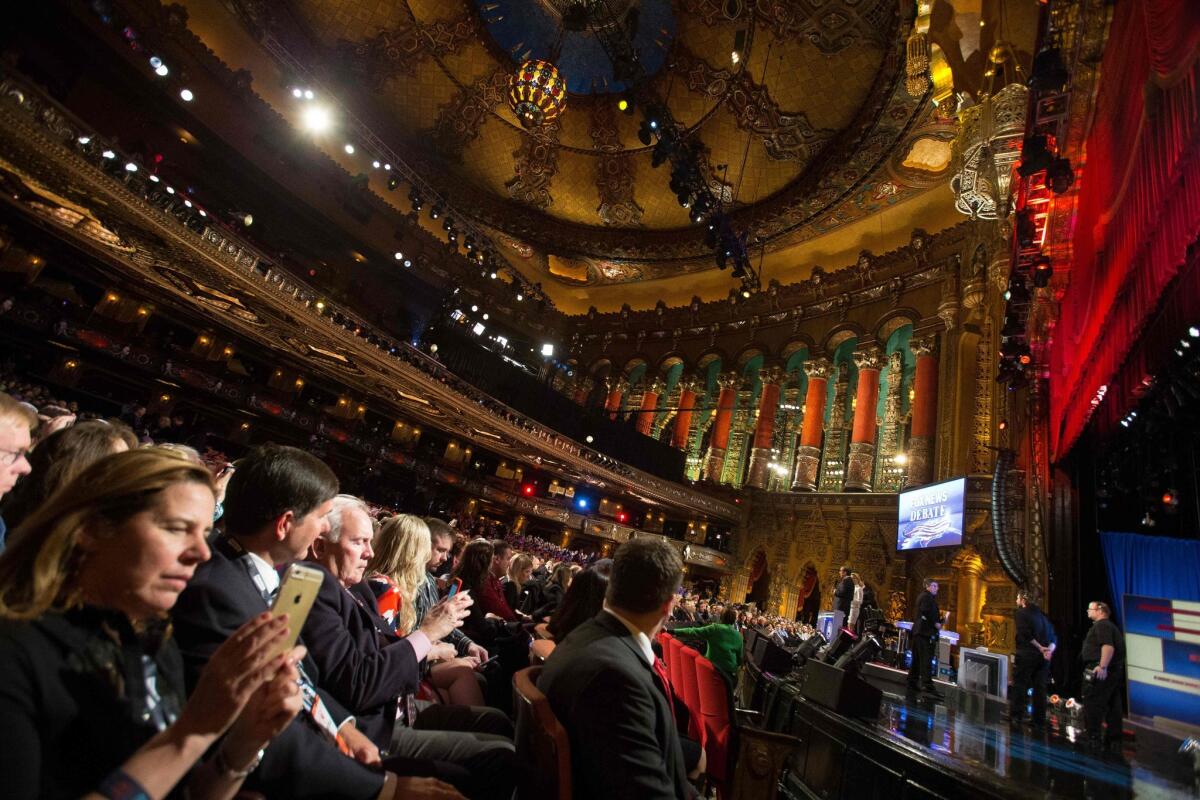
In addition to being historic, the site of tonight’s Democratic debate is significant for reasons of politics and policy.
Michigan is a critical state in the 2020 race for the White House. The state’s voters had favored Democrats in presidential races for two decades, until Hillary Clinton lost the state by less than 11,000 votes to Donald Trump in 2016.
The location also vividly illustrates many of the nation’s ills that are likely to be raised during the Democratic debate
Though the debate takes place in a rebounding downtown with fashionable restaurants and hotels, vast stretches of vacant and abandoned homes can be found a few miles away, visible proof of the economic decline of what was once one of the nation’s most prosperous cities.
The city borders Canada, where some Americans buy prescription medicine because it is cheaper there than in the United States.
Ten miles from here, a GM plant is being idled this week — the physical manifestation of the shrinking automotive and manufacturing industries that have decimated many Rust Belt communities.
The issues of environmental justice and equal access to healthcare are palpable an hour north of here, where residents of Flint are still struggling with a water crisis that led to at least 12 deaths.
- Share via
What are the 2020 Democratic presidential candidates’ positions on gun control?
Republicans have long used gun control as an effective cultural wedge issue against Democrats in national elections.
But when the 2020 Democratic presidential candidates take the debate stage in Detroit this week, don’t expect them to be so shy if the subject of guns comes up — which it might, given Sunday’s mass shooting in Gilroy, Calif., where a gunman with an AK-47-style rifle killed three people and wounded 12 others.
- Share via
7 things to watch for on Night 1
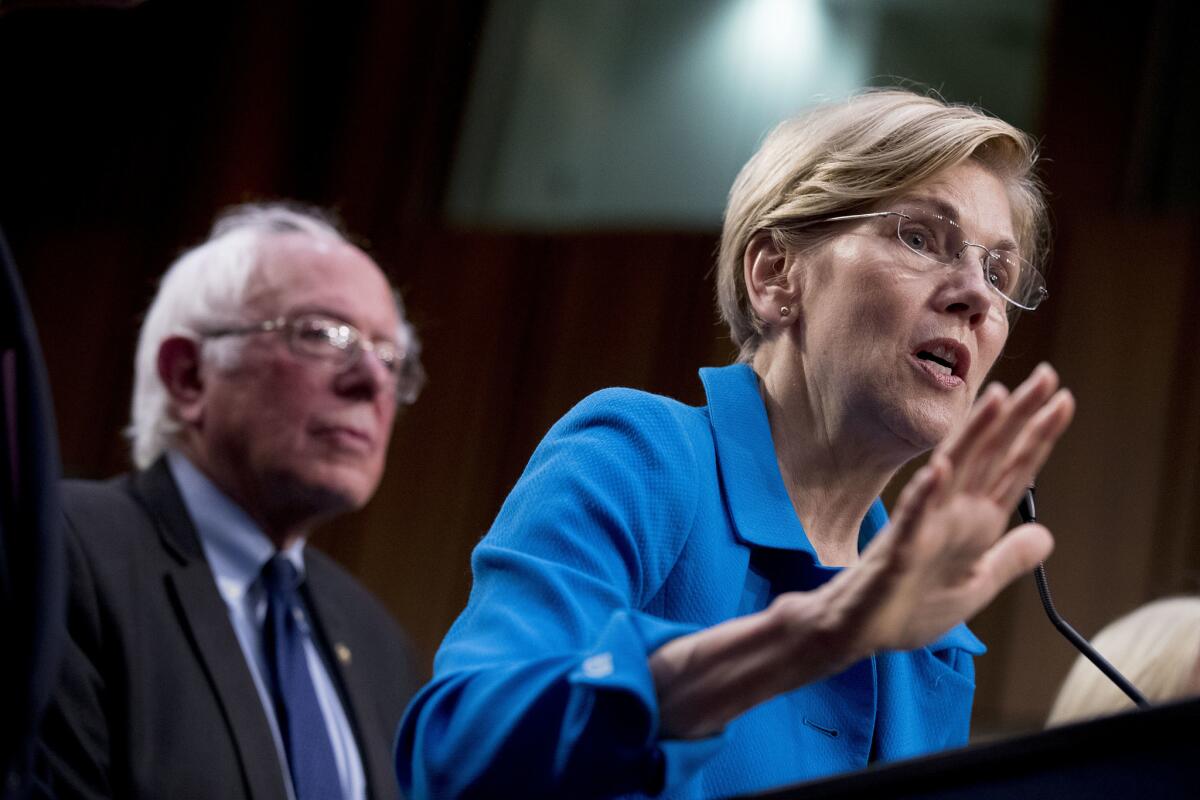
Bernie Sanders and Elizabeth Warren are friends and competitors. Do they lay a glove on each other?
Can Beto O’Rourke pick himself up, and what would that even look like?
Will any of the candidates bring up the mass shooting in Gilroy, Calif., to discuss their push for an assault weapons ban?
- Share via
Flint rebuilds after water crisis and years of distrust

Efforts to rebuild in Flint come at a time when the nation’s political spotlight will shine on Michigan because of the Democratic presidential debate 60 miles south in Detroit. Some candidates have already campaigned in the area, but so far there hasn’t been a renewed focus on Flint’s struggles.
The once-thriving city became the unwilling national symbol for urban decline and government neglect after it was devastated by the disappearance of the auto industry and an eroding tax base. Then, a state-driven attempt to save money by changing the city’s water supply led to the drinking water being contaminated with dangerous levels of lead — and at least a dozen deaths.
Locals are out to prove that what was one of America’s great industrial cities 40 years ago is on the verge of a comeback, with or without the help of politicians.
- Share via
Beers, nostalgia and worry in Michigan as historic GM plant closes
The closure of a GM transmission plant in Warren, Mich. — one of five GM factories being closed in North America by the end of 2019 — is upending hundreds of lives.
The factories all make parts for or assemble passenger cars such as the Chevrolet Impala and Cadillac XTS that GM is discontinuing in response to changing consumer preferences.
The closure of the 2.1-million-square-foot Warren plant is taking place in a county and a state that are crucial in determining who wins the White House in 2020. The plant’s home, Macomb County, is a bellwether that President Trump carried by nearly 12 points in 2016 and President Obama won in the two prior elections.
The factory’s official closure date is Thursday.
- Share via
Biden: ‘I’m not going to be as polite this time’

Democratic presidential favorite Joe Biden plans to more aggressively confront his rivals, notably Sen. Kamala Harris, he told thousands of African American voters at the annual NAACP convention in Detroit last week.
“I’m not going to be as polite this time,” Biden said at an evening fundraiser here, referring to the California senator who launched an attack on him during the first Democratic debate in June.
Biden’s remarks came after a full day of countering rivals who questioned his legacy and signaling that he was prepared to attack their records.
- Share via
Who won the first round of debates? Warren, Harris score stand-out performances
The Democratic Party opened its 2020 presidential debates in Miami on June 26 with a remarkably policy-focused exchange that illustrated how consistently to the left it has moved. For the night, at least, it was Elizabeth Warren’s party.
The Democratic senator from Massachusetts, who entered the debate with momentum behind her campaign, set the tone and dominated the early part of the debate, which focused on economic policy.
In the second debate, held the following day, California Sen. Kamala Harris upbraided former Vice President Joe Biden for his opposition to federally mandated busing for school integration and his reminiscences about his relationships with segregationist senators early in his career.
The ambush provided the capstone for a debate performance that showcased her strengths.

